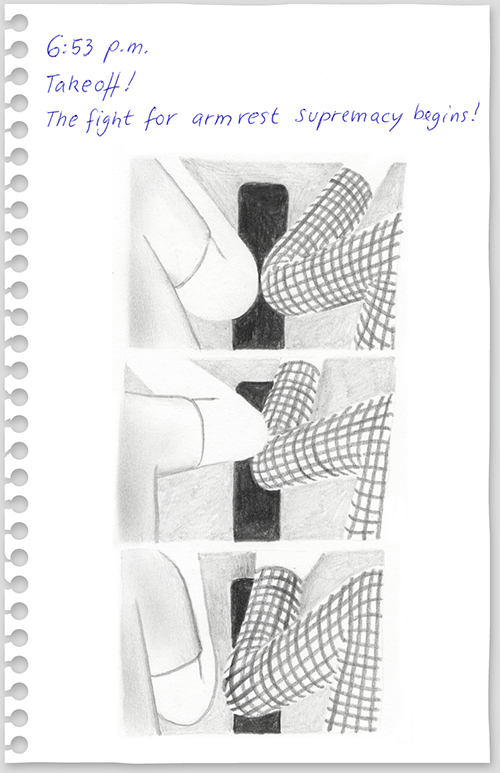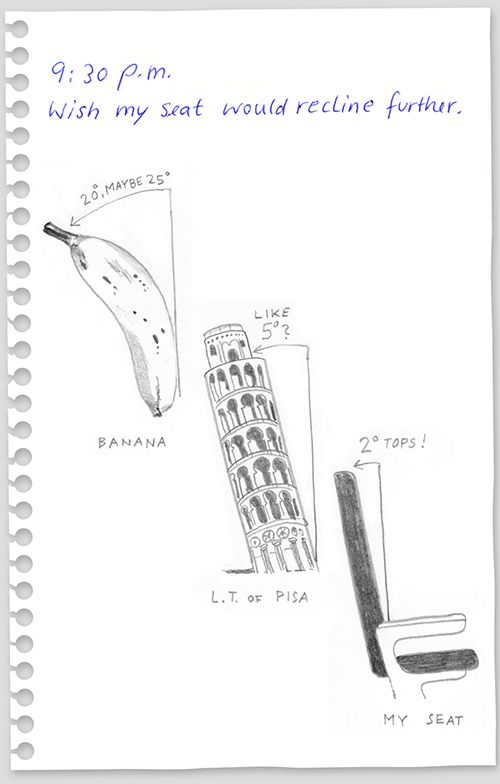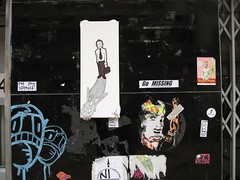The Null Device
Posts matching tags 'travel'
2019/10/31
As of today, I have lived in Stockholm for a year.
A year ago, I arrived at Arlanda on a one-way flight from London, with two checked bags and carry-on luggage; I caught the train to Stockholm, and a taxi (regular car-shaped, though a Tesla with a large iPad-like screen in the middle) to a friend's house. The following day, I picked up the keys to my new flat and went to awaited the arrival of the removalists with a lorryful of packed boxes. It got dark before they arrived, and I noticed my first difference between Swedish apartments and their Anglospheric equivalents: light fittings are not included. Other than the kitchen, each room was devoid of ceiling lights, having only a small socket (of a standard type) and hook on the ceiling. I quickly bought one light from a nearby thrift shop, and the flat wasn't completely dark by the time my things arrived, borne up the stairs by two muscular Russians who could plausibly have been Olympic weightlifters.
I stayed at my friend's place for a few more days as I made the flat habitable; gradually reducing the ziggurats of boxes to piles of flattened cardboard and a mass of familiar objects not yet having a canonical place, and making repeated trips to IKEA. After a while, it was habitable if cluttered; the clutter would take longer to fully dissolve.
Other aspects of getting set up in Sweden went relatively smoothly, if not always quickly. I was able to get a basic, limited bank account in a few days, though it took me a few months to get a Swedish personnummer (ID number); having one of those unlocks many of the mechanisms of the highly digitised, largely cashless society that is Sweden, including a digital identity infrastructure used for pretty much anything to do with finance and the Swish mobile payment system, which is used for everything from buying at flea markets to squaring up tabs. Trading my British driver’s licence for a Swedish one was pretty seamless. Other than that, there was not much hassle; for the moment, my British passport is sufficient to let me live and work here, and I’m informed that, in the worst case, I’ll have a year’s notice if that changes. I am, of course, hoping it doesn't come to that.
The year passed relatively quickly; winter came, shrouding Stockholm with snow and treacherous ice; spring followed, the ice melted, trees came into bloom, and the city came to life as the days became longer. By midsummer, there was barely any night left, only a few hours of twilight, though after the solstice, the night gradually began pushing back. I travelled a little, finding myself back in London more than I expected; first for a gig, then work, conferences, and en route to other events. London changed and yet remained the same (my old flat, with its low ceiling, stifling summer heat and the aroma of kebab grease never far away, had found a new tenant pretty much immediately; a favourite café closed down); friends were mostly still around, and I caught up with various of them on various visits. Ironically, my travels outside the UK have been fairly limited so far: a trip to Denmark for an exhibition, a visit to Barcelona for Primavera and a small amount of travel within Sweden.
❦
Every change of scene brings with it a change of perspective, and a test of assumptions. Moving from Australia to Britain, two cultures with historical connections and cultural similarities, was a subtly uncanny experience, partly from the differences between British and Australian cultures, but also between the actual Britain and any number of idealised Britains, absorbed through old books, childhood TV viewing, pop music, or other media. A move to Sweden, a country that can speak English and yet is not officially an English-Speaking Country, and that was always separate from the British/American sphere, was a jump to another subtly parallel universe; one familiar and different, in different ways than London was from Melbourne.
There are the obvious things: traffic, for example, drives on the right (which, if you cycled in left-driving countries, requires some retraining of muscle memory; I'm still not at the stage of favouring my right leg to rest on at stops). The architecture is more continental, and vaguely mitteleuropäisch, a world of art-nouveau apartments around courtyards in the Germanic fashion and more recent geometric modern blocks of post-Bauhaus functionalism, rather than either the Victorian terraces and semi-detached houses of Britain or the more Italianate terrace houses, motel-style flat blocks and American-style suburban bungalows of Australia. (My eyes, trained on the Anglosphere's landscapes, pick out echoes of other parts of continental Europe; a bit of Paris in Norrmalm, a cleaned-up, more affluent Berlin in Södermalm, and so on.)
Then there is the landscape the city is built on, which, being spread over a set of islands and peninsulae, is slightly fantastic. The pieces of land are often dramatically rocky, and as such, the city is full of sets of parallel streets on different levels, connected by steep stairways, dramatic overpasses and houses with different ground levels. (London has a few of those things as well, though nowhere near as many; Edinburgh probably comes closer.) Sheer rock faces often jut out on the sides of roads carved from them, with the entrances of parking garages or other facilities hewn into them. All this is surrounded by harbour views that make Sydney look bland by comparison. Out in the harbour are hundreds of islands of the Stockholm Archipelago, some inhabited and sporting timber houses, linked by a system of ferries. Then there is the city's small scale (it has only about a million inhabitants), and the fact that nature is never far away, which warps the perception of its space in interesting ways: I can leave my flat in Södermalm, cycle for half an hour (and Stockholm is a great city to cycle in, at least for the 8 months or so of the year when one can cycle without coming to grief on treacherous ice), and find myself in a secluded cove that, other than specifics of vegetation, looks like somewhere one may reach after driving for three hours out of Melbourne.
And, of course, there is the question of language. In Sweden, English is everywhere: almost every adult speaks it very well, companies which hire international talent use it internally, and one sees English around in the city: not just in bilingual signage, but in ad slogans, business names and repurposed neologisms (an “afterwork”, for example, is early-evening drinks in a pub). Some of this Swedish English does have a slightly uncanny feeling one can almost put one's finger on: shops with generic-looking names as if out of an architectural rendering, or English-style pubs with excessively English names, usually related to Charles Dickens. And yet, of course, the language of intellectual and cultural life here is not English but Swedish. After a while, one becomes aware of this, of there being layers one is not privy to. The locals generally are polite, and switch to English when a non-Swedish speaker joins their conversation, though it's there. This also exists in places where there is no language difference, only a different cultural history; while I have lived in Britain for 14 years, and have absorbed enough second-hand knowledge of recent British cultural history, I will never be British enough to understand the references in a Half Man Half Biscuit song. The language difference, though, adds another dimension to this; it is as if there were a membrane between oneself and the cultural life of the country; that until the moment when one becomes fluent in Swedish, one is disconnected, floating.
Sweden has an English-speaking personality, and a subtly different native-language one, which manifest themselves in their culture. The parts of Sweden one sees abroad are different. For example, if one were to think of Swedish indie music in, say, Britain, the US or Australia, one might think of Jens Lekman, or The Radio Dept., or perhaps The Knife. In Sweden, though, the biggest indie band was Broder Daniel, who, while they sang in English, did not match their local success abroad. (Second to them is the solo project of their drummer, Håkan Hellström, who did not sing in English.) Generally, Swedish indiepop in English was strongly influenced by British indie, particularly things like Sarah Records, C86 and the Glasgow school; switch to Swedish, and the reference points often become more elusive and unfamiliar, made for a domestic audience. On the subject of music, the live music scene in Stockholm appears a lot smaller than in London or Melbourne, with fewer gigs and venues; I'm told it used to be much better, before a lot of venues closed down, and/or in the Golden Age Of Swedish Indie, which was some 10-20 years ago.) What venues survive do so tenuously: the last outpost of the institution known as Debaser is facing an uncertain future, as its lease may not be renewed after next year. Record shopping also is a bit thin on the ground; in shops that sell new records, the range of new releases is fairly small; in one shop, the featured CD wall may have half a dozen recent releases, surrounded by rereleases and back-catalogue; if you want to fill in your Black Sabbath or Queen collection, you're sorted. There isn't really anything on the scale of Fopp, let alone Rough Trade, here (perhaps everyone in Sweden is over buying music, and just streams it on Spotify?), though for some reason, there is an abundance of secondhand record shops.
❦
Other things: there is an abundance of high-quality baked goods made with cardamom, cinnamon and/or saffron; Sweden is to those what Australia is to coffee, in that what passes for a cinnamon roll abroad would be unacceptable here. Sweden is a coffee-drinking culture; traditionally filter, though espresso is common now. If you want non-dairy milk in your flat white, there is generally one brand of local oat milk, whose ads are obnoxiously ubiquitous; a few places have soy milk, though nobody seems to import Bonsoy or make anything similar. The supermarkets have an abundance of dairy products, including pourable yoghurts in cardboard cartons (fun fact: Tetra-Pak is a Swedish invention), though Icelandic skyr is less popular than in the UK; oddly enough, Swedish supermarkets include things like caviar in toothpaste-style tubes and entire aisles of different types of bearnaise sauce. Sweden has a reputation for expensive drinks, though a beer is not much more expensive than in London; a gin and tonic, however, will set you back at least twice as much. There is also the state liquor monopoly, with its extensive network of well-provisioned booze supermarkets, previously discussed here; they are closed on Sundays for historical reasons. Sweden is historically Lutheran (and, before that, of course, Norse pagan), though no longer has an established state church. As far as I can tell, the Swedish ideas of lagom and Jante Law are, in practice, a bit like the English idea of social class: there's a grain of truth to them (though with many untidy exceptions), but they're vague enough that any commentator can find them in what they see, like a Rorschach inkblot.
In any case, Stockholm is a good place to live, if perhaps a bit quiet at times. It is easily the most beautiful place I have lived so far.
2018/10/30
I am writing this sitting in the empty shell of the loft flat in the liminal zone between Highbury and Stoke Newington that has been my home for the past 7½ years, ending today. In just under an hour, a taxi will come to take me to Heathrow, to my one-way flight to Stockholm Arlanda Airport. And so, one chapter will end, and another begin.
After 14⅙ years in London, five of them as a British citizen, I have decided to move on; this has been a decision some time in the making. Part of this is a desire to live somewhere else in Europe, not unlike the desire to live somewhere else that brought me to London, though hastened by uncertainty over how long that door shall remain open. Part, I say only half in jest, is a wish to escape the looming Brexit apocalypse. Though it’s mostly for a change: I have some friends in Stockholm, from previous visits, and an opportunity came up to move there.
Most of my worldly possessions are now on a lorry, somewhere on the continent; it's due to arrive in Stockholm tomorrow. I have been living out of a standard-issue Australian backpacker bag in my 25 square metre flat, now curiously empty.
I remember moving into this flat in February 2011; needing to find a place after a share house in Bethnal Green fell apart, and finding this flat, which was only £50 per month dearer than my room in the house, only realising after moving in that the kebab-shop vent points right at the bedroom windows. The first day, the tiny room ceiling-high with boxes, taking a break from unpacking to have a drink at the Edinburgh Cellars (now just the Cellars), and walking in to hear Visage's “Fade To Grey”; a portentous sign.
I won’t miss the tiny size of the flat, or the place being too hot, too cold or both at once, or the random odours of burnt oil/grilling meat/I dare not think what sporadically coming from the kebab shop downstairs through the brickwork, the occasional eye-stinging clouds of air freshener rising through the chimney-like stairwell and welling under the low ceiling of my flat like a neon-pink mustard gas when someone in the shop decides to do something about the nidor, or not being able to open the windows on one side because of the shop vent outside and the viscerally gritty stench of decades of fermented grease in the very air outside; I can tell you that the windows in that room remained sealed shut.
I will, though, miss the very nice Galician tapas place next to the kebab shop, and sitting outside it on the little piazza in the summer with a book, a beer and a basket of bread. I'll miss the views from my living room window, over the Victorian rooftops of Canonbury, of parts of the London skyline, the skeletons of unfinished luxury apartment towers on the horizon, their red lights like something out of a Simon Stålenhag painting. I will also miss the two cafés within a short bike ride, Mouse & De Lotz and Tina We Salute You, and the people who work there, almost all of them artists or musicians of some sort. And I'll miss being within walking distance of gigs at the Shacklewell or the Dalston Victoria, two former West Indian old-men's pubs colonised by Dalston hipsters and putting on consistently good selections of gigs.
I’ve gotten to know this city, or at least broad slices of it. The myriad numbered bus routes that link it, the cyclists’ ley lines. Favourite pubs and restaurants; the scenes of memorable events: gigs of various sorts, social engagements, the starts of friendships and relationships. A decade and a half of memories, highs and lows that are an inseparable part of my history, inscribed on the canvas that is London; the ancient, many-faceted city that has belonged to countless millions of people throughout its history, amongst them now myself. And the psychogeography of London—the actual, ineffable London of experience, not the fabled, phantasmagorical London of stories and legends—has, in turn, inscribed itself upon my psyche.
I first arrived in London for a visit, in 2002; at the time, the idea of Britain was intertwined with the country’s impressive musical heritage (for me, mostly post-punk through to indiepop; the first record I ever bought was a New Order 7", and I passed through Cure and Smiths phases, having settled at the time on MP3s of Sarah Records 7"s victimlessly pirated through SoulSeek). I moved to London two years later (as now, an opportunity came up, then in the form of a relaxation of working-holiday visa rules). Gradually, through living there, I became disabused of most of my romantic, anglophilic notions, settling into it being an actual place and condition of being, and the real place named London slowly displaced the idea of London, molecule by molecule.
Still, there was, for a long time, a sense of unreality: I am not of London, I thought; I am, like many others here, from somewhere else, and would not be in London forever; in a sense, I was just passing through. I met Londoners (some local, some from elsewhere in the UK), who all had their roots, their social circles, their references and in-jokes; I hovered on the periphery of these charmed circles, making acquaintances, and, more gradually, friends; at first, most were also newcomers, uprooted from elsewhere, but gradually, more Britons joined the mix; in retrospect, I was gradually becoming one of them.
Melbourne, though, was still my hometown, and if asked where I was from, I would answer without hesitation. I kept my 3RRR subscription to this day (for a while, I had a script on the computer in my room grab the streams of programmes, save them to a hard drive, and then play them back, time-delayed, in the morning, in lieu of an alarm clock; at one point, though, the scripts stopped working, and I didn't fix them, though I still tune in from time to time). There was a heavy Melbourne presence in my music collection (though with a leaning to bands I had known before 2004; the more recent “dolewave” indie-rock subgenre passed me by). And it was a joy to meet those from the same milieu and compare notes about the world behind.*
For a while, London, this city impossibly rich with history and myth, was just my present circumstance, one whose surreality I gradually got used to and stopped noticing.
Only now, having spent the past week or so saying goodbye to this city, walking the streets of Stoke Newington, acutely aware that soon it would be just another place somewhere else, did the reality sink of London as a former home I might miss, a place of which nostalgic memories might spontaneously bubble up. That as well as a displaced Melburnian, I would also be, to some degree, a displaced Londoner.
* At this point, you may be wondering what sort of accent I speak with. While my accent was never broadly “Australian” in the manner of, say, Crocodile Dundee, and a mild Australian accent is not that different from a mild Estuary English accent, I am told that I do sound more British; on my last visit to Melbourne, an elderly family friend remarked that “you sound like a pom”. However, people in Britain sometimes notice a telltale hint of an Australian accent in my speech.
2014/5/27
I am currently spending some time in Barcelona, once again on occasion of the Primavera festival.
 Whilst in the narrow, winding streets of the old town, I noticed a marmot-shaped door knocker on one door. This immediately brought to mind the French idiomatic expression croquer le marmot (to stand hesitantly at a door with one's hand over the door knocker, without following through), marmot-shaped door knockers presumably being customary in those days. This expression was, of course, memorably gifted to the English language as “to craunch the marmoset” by Pedro Carolino, the non-English-speaking Portuguese author of English As She Is Spoke, an unintentionally surreal (and, needless to say, entirely unusable) Portuguese-English phrasebook.
Whilst in the narrow, winding streets of the old town, I noticed a marmot-shaped door knocker on one door. This immediately brought to mind the French idiomatic expression croquer le marmot (to stand hesitantly at a door with one's hand over the door knocker, without following through), marmot-shaped door knockers presumably being customary in those days. This expression was, of course, memorably gifted to the English language as “to craunch the marmoset” by Pedro Carolino, the non-English-speaking Portuguese author of English As She Is Spoke, an unintentionally surreal (and, needless to say, entirely unusable) Portuguese-English phrasebook.
A contemporary equivalent of craunching the marmoset would presumably involve hovering over the SEND button in one's email client or something similar.
2014/2/19
10 tips for Japanese travellers to the US, covering the Americans' culinary and sartorial customs, leisure activities and their (somewhat impoverished) vending machine culture, among other things:
In Japan, hip hop clothes are considered stylish. But in the United States, it is wise to avoid them, as you might be mistaken for a member of a street gang. The entire United States does not have good security, unfortunately. However, the difference between a place with good regional security and a “rough area” is clear. People walk less, there is a lot of graffiti, windows and doors are strictly fitted with bars. And young people are dressed in hip hop clothes that say "I want you to pay attention to me!"
If you put your bent middle and index fingers of both hands in the air, you are making finger quotation marks. It means you do not believe what you are saying. You can also say, "or so called."
In America, when men or women laugh, they do not turn away. They face front, open the mouth, and laugh in a loud voice. This is because in America if you muffle your laugh or turn away while laughing, you give the impression that you are talking about a secret or name-calling. It is nasty.
2013/9/19
The Financial Times' blog section, of all places, has an interesting travelogue of the southeastern Danube, the ancient dividing line between central Europe and the Balkans/the West and the East/Catholicism and Orthodoxy/Christendom and the Ottoman Empire:
A Roman bridge linking what is now Romania with Bulgaria collapsed in the fourth century and from then until another was built 1954, there was no crossing. This summer saw the opening of only the second link between the countries across the Danube, a 2km, €245m bridge between Vidin in Bulgaria and the Romanian city of Calafat. Engineers working on the project, now grandly christened the New Europe Bridge, resorted to a third language, English, to communicate with the precision required for the millimetrical convergence of rails and highway.
Our trip had begun in Bucharest, unexpectedly appealing in a melancholy way with its crumbling neoclassical buildings. The Gallic inspiration for what was once celebrated as “Little Paris” is evident in broad boulevards radiating from Place Charles de Gaulle – which our guide described as “named after the great French revolutionary” – an attribution that might have surprised the conservative general. The square was originally named Piata (meaning “marketplace”) Jianu, after local folk hero Iancu Jianu. It was renamed Piata Adolf Hitler in 1940; followed, in 1948, by Piata Generalissim IV Stalin, in honour of the country’s “liberation” by the Red Army.
Just off it is the outdoor Village Museum, where traditional houses from Transylvania (complete with anti-vampire features) and other regions have been reassembled beside a lake. Chickens scratch the dirt, the property of the peasants periodically imported to lend authenticity.Meanwhile, to commemorate the upcoming German elections, the Guardian's user-contributed photo section has a gallery titled Alternative Germany, most of which is not art-squats in Berlin.
2013/4/28
Visual treat of the day: Endbahnhof; a collection of photographs of all of Berlin's splendidly varied U-Bahn stations, by Melbourne photographer Kate Seabrook, who moved to Berlin some years ago. The platform are all photographed empty, without passengers or extraneous distractions, capturing the variety of architectural styles: from baroque grandeur and Jugendstil fancy to explosions of psychedelic kitsch, crisp modernism, and various steps in between. (And, of course, the nondescriptly utilitarian stations, typically on the outer reaches of lines, sporting just the stock BVG signage haven't been omitted.)
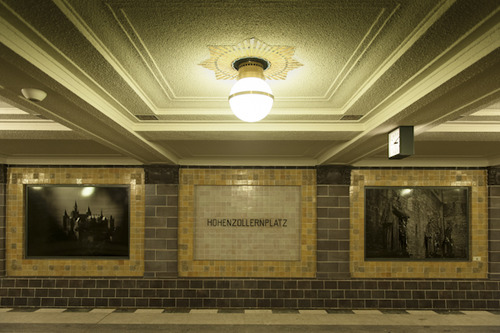
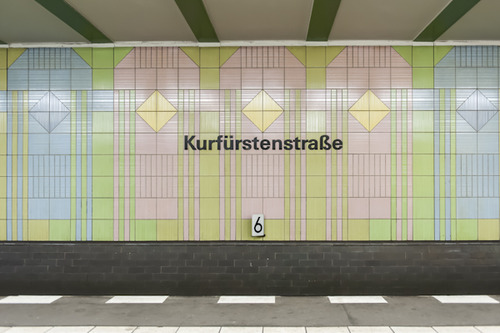
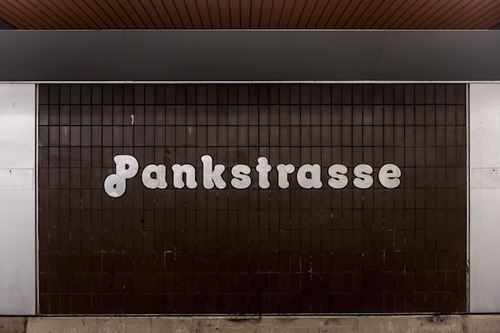
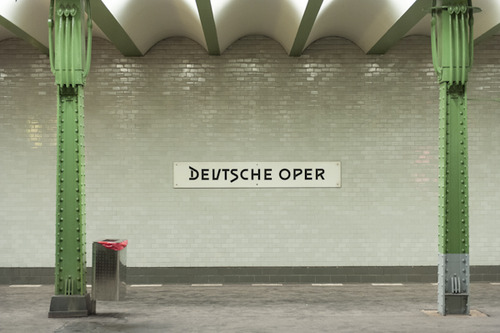
There's a piece about Endbahnhof in Atlantic Cities here, and an interview with Seabrook in Australian twee-culture bible Frankie here.
2011/12/25
The Forbidden Railway: the story of an unescorted journey by train from Vienna, through Russia, and to North Korea over a route officially off limits to tourists, by two rail travel enthusiasts—one Austrian and one Swiss. Includes plenty of photographs and details about the journey and the places encountered.
2011/5/2
I am currently visiting Sweden for a few days; consequently, I now have a Swedish mobile phone number.
I have no plans to actually move to Sweden, and no current plans to return (though it's not unlikely that I will at some point), and so the +46 number I have will most probably sit idle, the SIM card in a drawer next to the German card I bought in Berlin last year (unlike that one, though, this card can be topped without having a local bank account in the country in question, making it more likely that I'll reuse it). But at the moment, the SIM card is in my iPhone, providing me with access to maps and similar services on demand, and my British SIM card is in my second phone (a Palm Treo 650, a piece of mid-oughts executive power-tech that looks ridiculously clunky these days and probably will be considered retro one of these decades).
The reason I went to the somewhat absurd extent of investing 99 Kr (almost exactly £9.90) in a foreign telephone number I will use for a few days is because of the unusable state of data roaming in 2011. While, in the EU at least, roaming charges on phone calls and text messages have come down, data still remains prohibitively expensive, with the foolhardy user who enables data roaming on their smartphone likely to drain their prepaid credit in minutes or, if on contract, be on the hook for thousands of pounds.
Things have improved slightly, though not enough to make using a smartphone abroad with one's own SIM card remotely economical, except for the super-rich and those with the deepest of expense accounts. For example, Vodafone (my UK carrier) now offers either 5Mb or 25Mb (depending on the country) of data abroad for £2 a day, with subsequent use being charged at £1 per megabyte. I tried using this when in Paris a few days ago, and found, to my chagrin, that the quota evaporated within ten minutes of idle time. Presumably Vodafone's offer is intended for users of something other than modern smartphones. Not quite sure what: perhaps those social-network featurephones marketed to teenagers with limited allowances?
I suspect that this has less to do with smartphones sucking up vast quantities of data and more to do with the way roaming data being metered being incompatible with the way smartphones use data. I imagine that what is happening is that, for billing purposes, one megabyte is one megabyte or part thereof, and the clock stops whenever the phone stops sending or receiving data for a period of time and/or when the phone connects to a different server. Which was probably fair enough a few years ago, when the much simpler phones did one thing at a time, and internet access on phones was an afterthought, a special mode added on after the fact. Today's smartphones, however, are entirely different beasts, being effectively UNIX-based computers designed to be permanently connected to the internet, and constantly sending and receiving small quantities of data, from notifications to location hints. Because this data is sent as internet packets, a premium-priced service on top of the mobile phone network, the partial megabytes soon stack up, and so does the bill.
With smartphones, we're living in The Future, but only in our home countries. There, we can pull down maps, check email, upload photos to the web, and even, particularly ironically, get spoken text translated into other languages. Elsewhere, we're still in the mid-2000s, forced to rely on pre-cached data and scrounge for open wireless access points (themselves an increasing scarcity, due to the three apocalyptic horsemen of terrorism, paedophilia and copyright infringement). Of course, one can, for a tenner, buy a new SIM card, and then freely use the same networks one would otherwise be paying through the nose for, at the cost of losing access to one's phone number for the duration. Which, all in all, is an absurd situation, and The Future won't officially arrive until this is resolved.
2010/10/5
Scottish novelist AL Kennedy rides the railroads of North America whilst working on her latest novel, and writes about it:
Lately, I have been spending a good deal of time in Penn Station and have wondered – not for the first time – whether 65% of the people waiting for trains there appear to be seriously mentally distressed because they arrived that way, or because they have stepped into an alternative universe of heat, bewilderment, pain and ambient evil. You may be aware that many US rail stations are grand expressions of generous respect to their users, full of stately perpendiculars, handy benches and lots of gold leaf – high-ceilinged temples to mass transit and the communal hopes of a bygone age. Penn Station is there for balance: to remind you that this Depression will not produce a New Deal, and that many members of the general public are surplus to requirements; and to hint that your train will travel at the speed of lazy treacle on a cold day, will shudder along rails that even Railtrack would call poorly-maintained, and will give priority to freight, cars, pedestrians and any animal above the size of a healthy adult woodchuck.(Penn Station, for what it's worth, was once a majestic railway station in New York; though some time in the 1960s, it was demolished and rebuilt as a depressing warren of subterranean tunnels that makes Heathrow Terminal 2 look like a cathedral by comparison; thus making an all-too-convenient metaphor for the icaresque fall from grace of passenger rail in car-centric America.)
Yet I continue to love American (and Canadian) trains. I am trying to rebrand my debilitating and expensive fear of flying as Steampunk Travel and – at a certain level – I find I am convincing at least myself that rail transportation is a good and lovely, as well as an ecological, option. US trains are roomy, their passengers have no expectations and therefore often eschew UK passengers' lapses into frenzied disappointment and rage when they are delayed, misled, or ignored. Plus, US trains are still rich in the iconic elements that I, lover of black and white movies that I am, find intoxicating. They are monumental: they still roll majestically into stations with their bells ringing like harbingers of strange mortality, they still hoot across the countryside in the manner of wistful mechanical whales, the conductors still wear little round blue conductor's hats and the Red Caps still wear red caps – although sometimes they're baseball caps
2010/9/20
A direct channel tunnel rail service from London to Germany is looking one step closer: on the 19th of October, Deutsche Bahn will drive a test train through the tunnel, and into London St. Pancras. The train, one of DB's ICE3 high-speed trains, won't be carrying passengers; it will be participating in a safety exercise in the Tunnel, part of stringent tests which will need to be completed before such a service can be approved, and then being exhibited at St. Pancras in a publicity exercise.
There are a lot of tests which need to be undertaken, especially for trains which were not designed specifically with the tunnel in mind (as the Eurostar fleet were). However, if all goes well, Deutsche Bahn are expecting to run a service from London to Frankfurt, via Brussels and Cologne, from the end of 2013. The service is is expected to take 4-5 hours between the two financial capitals, about the same time as London to Edinburgh; while conventional wisdom says that rail is not competitive against air travel for journeys longer than four hours, this may no longer be the case, thanks partly to longer air check-ins and tighter security restrictions, and partly to Deutsche Bahn's exceedingly comfortable trains, or so Mark Smith (of The Man In Seat 61 claims):
A direct train could cut London-Cologne to 3 hrs 55 mins. This would compete with air not only on speed and convenience, but on comfort – DB's ICE trains are among the most comfortable trains in the world, being designed to tempt German businessmen out of their BMWs and Mercedes, with power sockets for laptops at every seat and WiFi on many routes. And using DB's current ICE fares to neighbouring countries as a guide, I'd expect a London-Cologne or London-Frankfurt journey on any new service to start at a very affordable €49 (£41) or even €39 each way, with no need to pay to get add the cost of getting to and from airports.I'm not convinced it'd be that cheap; the tunnel, after all, is a privately-run monopoly, with steep access fees, which would be factored into the ticket prices, though I imagine that it might well end up cannibalising the air travel market between London and Frankfurt (at least for scheduled flights; high-powered businessmen with private jets would presumably keep those), much as Eurostar did to air routes between London and Paris and Brussels.
2010/8/9
New York Times illustrator Christoph Niemann recently flew from New York to Berlin, and spent the flight illustrating his experience. I imagine anyone who has ever taken a long-haul economy-class flight will identify with it:
2010/2/14
A travel correspondent from the Guardian visits North Korea:
I've been allowed in as "a travel consultant" and in this capacity I'm happy to report that visiting North Korea is surely one of the greatest holidays on earth. You will see only what everyone else who goes to North Korea sees: which is what the North Korean government wants you to see. In this, it reminds me of Hello! magazine. I've always marvelled at how celebrities, given editorial control, choose to portray themselves. And so it is with North Korea. You may not get to see the "real" North Korea, but this "unreal" North Korea is a fascinating thing in and of itself. Because this is tourism at its most perfected. It's like a cruise ship. Every minute of every day has been pre-formulated and it's beautifully worked out: from the €5 charge if you want to try the national speciality, dog soup, to the man with a video camera who follows our every move, and at the end of the tour produces a DVD of our visit set to martial victory music, and sells it back to us for €40 a pop.
2009/11/28
The New York Times has an article on the thriving indie music scene in Athens. Athens, Greece, that is:
The artistic director, Konstantinos Dagritzikos, who plays drums in the ’60s-influenced band Love Beverly, says he tries to maintain a balance between booking local independent bands and acts from abroad, like the London-based electro-punk outfit Publicist, which played at the opening, and the English D.J. collective Disco Bloodbath (traces of this group are still visible in the form of splattered fake blood handprints on Six D.O.G.S.’s graffitied facade).
Though musically diverse, the bands currently emerging out of the Athens scene like the Callas, Phoenix Catscratch, the singer-songwriter Monika, and My Wet Calvin, an experimental indie pop act that often performs in animal costumes, all share a commitment to wild, unconventional live shows and a high-concept, do-it-yourself aesthetic.I recall that there was apparently an indiepop scene in Athens in the 1990s, informed by Sarah Records-style pop from the UK and El Records/Shibuya-kei-style bossa-pop, with acts like The Crooner (who, if I recall correctly, had a few songs on compilations from the German label Apricot).
2009/10/19
Travel search engine of the day: Adioso. This is a new natural-language-based flight search system. It differs from sites like Kayak in that, rather than accepting simple queries in a set of fields (origin, destination, dates), it accepts queries as natural-language sentences, and allows a good deal of fuzziness. So, for example, if you want to go from London for a weekend in Barcelona in late November, you can ask for "London to Barcelona weekend late November", or if you just want to get out cheaply, you can ask for "London to anywhere under GBP100".
Well, you can if your destination is supported. The site appears to be Australian, and thus Australia and popular destinations from there (south-east Asia, the UK and US, and places along the "Kangaroo Route" to London) are well supported, while Europe (minus sunny holiday spots) is a bit patchy. The site found no flights from London to either Berlin or Stockholm, and drew a blank altogether at Reykjavík (the closest match it could find was Tel Aviv; I guess that sort of sounds like Reykjavík, if you're shouting across a noisy room or something). Flights across Australia it handles well, though, finding better prices than Kayak. In any case, the site claims to be in beta (though whether it's an old-fashioned beta or a Google-style permanent beta is uncertain), so with any luck, they'll improve it.
2009/10/6
There's another travelogue to North Korea, this time from The Times:
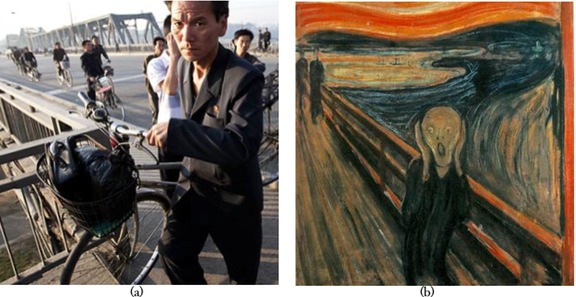
Superficially, Pyongyang is an impressive and agreeable city, but its cleanliness, orderliness and majesty are consequences of the oppression at the heart of North Korean life.
The four days that The Times spent there were a packed tour of monuments, each one a shrine to the Great and the Dear Leader. There was the Mangyongdae Schoolchildren’s Palace, where prodigies staged a faultless performance of songs, dances and music in praise of Kim Jong Il and his father. There was the Grand Monument to Kim Il Sung, a 20m (66ft) bronze statue of the man who, even in death, remains the official head of state.
This is the reason why the air in Pyongyang is so clean and you can see the stars — industry has ground to a halt, there are fuel shortages and not enough electricity to light the streets.The article also has an interesting photo slide show.
2009/5/22
The (Melbourne) Age's travel blog lifts the lid off a little-known range of discount British rail passes. The tickets are known as "Ranger" and "Rover" tickets, can go for as little as £10, and generally offer unlimited off-peak travel within various areas:
The Rangers are the most basic deals: they simply offer unlimited travel within a certain area for a day after a certain time (usually 9am or 9.30am). For example, the Cornwall Day Ranger costs £10 and allows holders to go across the whole county, plus parts of neighbouring Devon. In a theoretical day out, it would be possible to take in seafaring heritage in Plymouth, surfing at Newquay, Pendennis Castle in Falmouth and world-class art at Tate St Ives.
Pretty much every area of the country is covered by one Rover or another. For example, there's a Freedom of Scotland Travelpass (four in eight days) that covers the whole of Scotland for £105. The Freedom of Wales Flexi Pass is available on the same terms and allows travel across the whole of Wales plus a few towns over the English border such as Shrewsbury, Hereford and Chester. It costs £74.
The utterly absurd thing about the Ranger and Rover passes is they can often be cheaper than a single ticket between two stations covered in the region. For example, an off-peak single from Portsmouth to Cardiff costs £67, while the Freedom of Severn & Solent Rover allows travel across a much larger area for three days out of seven and costs £40. The craziest example is the train from London to Stratford-upon-Avon. The walk-up single fare can be £67; the one-day Shakespeare Explorer ploughs the route, stopping at the likes of Warwick Castle and Wembley Stadium on the way for £30.These passes, unlike the BritRail passes you can get in travel agencies abroad, don't require you to be outside of Britain at the time of purchase. Of course, Britain's railway companies protect themselves from being taken to the cleaners by customers by the simple expedient of not advertising or publicising these deals very widely; to get one of these magic tickets, one has to go to a ticket office and explain to the clerk what exactly one wants and that, yes, it exists. There is a page listing them here, for those willing to do a bit of potentially profitable digging.
2009/4/21
Der Spiegel has some evocative photographs from East Germany, taken by West German photographer Karlheinz Jardner in 1990, not long after the wall came down. It includes shots of room interiors frozen in the perpetual 1970s of the DDR, dilapidated provincial cities with Trabants, more Trabants, luxury hotels reserved for the Communist Party elite, dilapidated seaside resorts, cheerful urchins with piles of coal, uninspiring consumer goods and symphonies of grey; some glimpses of a parallel world, just before it disappeared.
And here is a Fortean Times piece on "The Ghosts of East Berlin".
2009/4/16
Your humble correspondent is now back in London, having returned this evening from Iceland.
Iceland, you will be glad to know, seems to still be there. There is still a Reykjavík, and it's still a living city (except perhaps on public holidays, when everything closes). Hallgrimskirkja still stands tall, visible from across the city, though now it's covered in scaffolding. Laugavegur is still full of groovy cafés and bars (though fashion boutiques, apparently, have been closing down), and 12 Tónar still has an excellent selection of music, much of it by new Icelandic bands. Furthermore, the café culture leaves London in the dust, as does the quality of the coffee on offer. Alcohol is still more expensive than elsewhere in Europe, which still fails to deter the locals from consuming it enthusiastically. Outside of the capital, there are still spectacular fjords, glaciers, waterfalls and desolate landscapes.
Politically and economically, Iceland is undoubtedly in trouble, though not without hope. It looks like the conservatives, who have governed forever, will be ousted at the next election, with a Social Democratic/Leftist Green coalition likely to govern. Scandinavia is being cited as a model for governance. And while the prospect of Iceland joining the EU has been cited, it remains unpopular with the population, and looks likely to go to a referendum if it comes up. Meanwhile, the Icelandic people are developing a taste for protest and for rocking the boat in an uncharacteristic way. During a visit, I saw an empty building which had been taken over by squatters, who intended to set up a community centre. On Tuesday evening, the building was surrounded by activists, anxiously awaiting a police raid. (Squatting is uncommon in Iceland, and there is no concept of squatters' rights there.) Anyway, only time will tell what will happen.
Anyway, I have posted photos from my visit to Flickr; they can be found here.
2009/3/4
The Times' travel section has another crop of stories about rail travel; this time around, they include a piece on the spectacular Settle-Carlisle line, one on traversing provincial Japan by slow train, a piece on crossing the USA by train (from New York to Chicago and then Los Angeles) a piece on crossing the USA by train, and Mark (the man in Seat 61) Smith's list of four great European rail journeys.
2009/2/24
I just caught the overnight sleeper train from Sydney to Brisbane. The Sydney to Brisbane passenger railway service is operated by Countrylink, an arm of the New South Wales government, as a subsidised public utility, essentially targeted at rural and regional areas; these services include two trains a day, in each direction, between Sydney and Melbourne and Sydney and Brisbane.
In general, I was quite pleased with the service. They don't do economy-class sleeper carriages on Countrylink, so my choice was one of booking a first-class seat and a sleeper bunk or spending 14 hours in an upright seat. (I once did this going from Sydney to Melbourne; it wasn't enjoyable.) Anyway, I shelled out for a sleeper; it didn't cost much, about A$216, or less than £100. When I arrived, the train attendant (a friendly young woman named Shannon) informed me that, while I had been going to share a (2-bunk) cabin with someone else, they had been moved to a separate compartment, giving me one to myself; I'm guessing that they didn't have enough passengers to fill up the entire sleeper carriage. This was a pleasant surprise; the compartment, consisting of three seats and transforming into two bunks, seemed quite luxurious, in an unostentatious way. (There were none of the standard signifiers of luxury— no leadlighting or wood panelling, for example—it was all utilitarian melamine and carpeting.) The sense of modest luxury was rounded off with a complimentary package containing Arnott's crackers, Bega cheese, a tomato-and-curry dip, mineral water and a Tim-Tam biscuit. The compartment had a power point, though it was explicitly for shavers only. (This is another difference from trains in Britain, where one is encourage to plug in one's laptop or charge one's phone.) The power point turned out to be suitable for charging a laptop, though didn't yield enough power to actually run one; when I tried to run my MacBook from it, it thought it was running off mains power, though actually depleted its battery until it shut down. Needless to say, onboard wireless internet access was absent and is unlikely to be coming any time soon; the fact that most of the passengers ranged from their 50s to advanced old age, with a backpacker contingent in economy class, is probably further disincentive to spending money on such new-fangled fripperies.
Countrylink, unlike most railway services these days, is state-run, and not entirely at the mercies of market realities. Because it is considered a vital piece of infrastructure, it receives hefty subsidies, and consequently, their prices are quite low. (Economy class from Melbourne to Sydney can be as low as A$70, if you take advantage of a special offer.) Unlike in Britain or Europe, their fares don't change; rather than selling a handful of ridiculously cheap tickets and gouging those without the foresight to book months in advance, they charge the same fare whenever you book. The food is cheap and not very exciting; $8 or $9 gets you what's essentially a microwaved meal, and the complimentary breakfast consisted of a bowl of cereal, two slices of toast and a cup of warm water and a teabag. It is, however, forbidden to drink any alcohol one hasn't bought on the train (an offense punishable by a $400 fine, and enforced by roving transit officers in uniform; I imagine one could get away with it in a private compartment, though I didn't try it), and the only beer sold onboard was a rather ordinary light lager named Hahn.
All in all, the sleeper train is a pleasant way of getting from Sydney to Brisbane; the first-class compartment was quite comfortable, and the daytime portion of the journey was, in places, quite scenic. The one major flaw, though, was the timing. I suspect that Countrylink, much like Amtrak in the US (a similar state-subsidised passenger rail service), is near the bottom of the pecking order for access to tracks, and basically gets what the freight operators don't want. Which would be the only explanation for why the sleeper train to Brisbane leaves Sydney at 16:20 and arrives in Brisbane at 5:20 (Brisbane time; 6:20 Sydney summer time), with passengers being woken at 4am for breakfast. Also, unlike other services (the Caledonian Sleeper, for one), there is no possibility of staying onboard and sleeping until a reasonable hour; the same train is used as the daytime service, and goes back to Sydney within an hour of arrival. Which is undoubtedly convenient for the operators, though less so for their passengers.
2008/10/8
One thing you can do more easily in Britain than in Australia is hop on a train to see a band in another town later that evening; partly because Britain has trains which run at more or less reasonable frequencies and partly because there are other cities with interesting music scenes within two hours' travelling time. While in Australia, everything tends to coalesce in the inner parts of capital cities, and all roads lead to inner northern Melbourne, in Britain, things are more distributed; while London is a global centre of commercial music and the media, there are thriving grass-roots music scenes in other areas, such as Cardiff, Glasgow, Manchester, Birmingham and the East Midlands. In particular, the area around Derby and Nottingham has become an epicentre of indiepop. And so it was to Derby that I caught a train last night to see the last-for-a-long-time gig by The Deirdres.
I caught the 18:45 train towards Carlisle, getting off at Tamworth station (a small two-level station, where the line from London towards Carlisle crosses the one from Birmingham to Derby), climbing the stairs to the upper platforms and catching a train to Derby, arriving at about 20:30. After checking into a B&B, I made my way to the venue, a pub/bar named Vines.
The Deirdres gig, being their last one for at least five months (and possibly forever), was themed around things that hibernate; on entry, one had to name something that hibernates, which was then drawn on one's wrist in lieu of a stamp. The Deirdres themselves were in fancy dress as hibernating animals; there was a caterpillar/butterfly, a turtle, a bear and a hedgehog among others. (One member, Keir, was not in costume; his costume was meant to be a computer, but apparently broke; he said it was because it was a Windows PC and not a Mac.)
Anyway, they put on a great show, playing with their usual exuberantly playful enthusiasm. (A Deirdres show feels a little like an I'm From Barcelona show, only smaller and without the confetti.) Much like the other shows of theirs I've seen, it looked chaotic and ramshackle on the surface, but was held together with impressively tight and well-rehearsed musicianship, not to mention some quality songs. IMHO, The Deirdres are perhaps the most exciting indiepop band in the UK today.
Before their set, they also screened, for the first time, the new video they and some friends made for their song Milk Is Politics. The video's theme has little to do with the song title or its lyrics, instead being a somewhat twee, slightly silly adventure concerning eggs. It's pretty much what you'd expect a Deirdres video to look like, and is rather ace. Anyway, it has now been uploaded to YouTube, and you can see it here:
2008/7/2
An artist in Portland, Oregon bought an old Pullman rail sleeper car and converted it into a living/working space. The interesting thing here is that it's not sitting in a yard somewhere, sans wheels, but is on the North American railway network. It's stabled at a private siding, for which the owner pays $150 per month; electricity, cable TV and DSL are available. Should the occupant get bored of their locale, they can move anywhere on the railway network by getting a freight rail company to attach their wagon to a train and move it, for $1.50 a mile.
Now that it's known that one can rent private sidings with facilities, and contract freight train companies to move your home around the railroads, perhaps a new subculture of bohemian railcar dwellers (let's call them "boho hoboes") will arise, comprised of similar sorts of people that live in houseboats in Europe. And perhaps the railway revival that some are saying expensive oil will lead to will include new private, full-service sidings catering to the new hipster-hobo class.
I wonder whether something like this is possible outside of America. Could Europeans take advantage of the European railways' open-access rules to do something similar? If so, could an European rail dweller bounce around the entire EU at will for euros per kilometre? What about in Britain? (Though there, the problem arises that British rail cars, and the spaces between platforms, are quite narrow, which could make living arrangements somewhat cramped.) Could one make a railcar home compliant with British and continental standards and the Channel Tunnel's safety standards and cross the Channel with it? I'm guessing that in Australia, where the railway networks are more fragmentary and limited (and old sleeper cars are somewhat scarcer), such a thing could be more difficult.
2008/6/14
2008/4/24
The reason that this blog was quiet for the best part of a week was that your humble correspondent was on vacation in San Francisco. A few observations:
- Heathrow Terminal 5 is, now that the bugs appear to be ironed out, quite a decent airport terminal to depart from and arrive at; the architecture is at once striking (particularly in first impressions, when ascending in the lift from the tube) and practical, and there are plenty of amenities. Getting through immigration was very fast (in contrast, the last time I went through one of the last terminals, I spent an hour queueing at passport control).
- Similarly, I had no problems getting into (or out of) the US. My checked-in possessions weren't stolen by corrupt minimum-waged baggage-screening staff, and nor did I at any time feel intimidated. The entry process was much the same as it is in the UK.
- There is WiFi reachable from almost every café or bar in San Francisco proper, and it's invariably free. None of the miserly paywalling that's the norm in flint-hearted London. Also, people carry and use laptops everywhere; even on commuter trains at 10pm when no-one without a death wish would do so in London. The cafés (from countercultural establishments in the Haight to corporate chains with earth-toned seating and all-Kenny-G music policies) are full of laptops, with a definite majority being Apples. I saw more glowing Apple logos in my six days in the Bay Area than in the entire rest of the year.
- The Tenori-On launch in San Francisco was great; Toshio Iwai's talk was much the same as in London last year, though the guest musicians were different; in particular, I Am Robot And Proud's set (featuring Tenori-On and live piano) was very impressive. (Those hoping for a price cut, though, will be disappointed; the US price is $1,200.)
- On Tuesday, I went to Ignite SF, a geek show-and-tell organised by some of the O'Reilly people, at the infamous DNA Lounge. It was quite interesting, with topics varying from web 2.0 stuff (user-generated content, social software anti-patterns, and so on) to the more outré (robots, giant monsters, and the (briefly) user-accessible LED sign at the DNA Lounge that fell prey to trolls). It was rather interesting; like a briefer, more theory-focussed Dorkbot.
I also took some photos, which are being uploaded to my Flickr page, and will be added to this set.
2008/4/2
It is apparently possible to travel around England entirely by local bus, if one doesn't mind doing so at a leisurely pace. And here are the timetables for getting from Penzance to Berwick-upon-Tweed entirely on local buses; the journey takes six days.
Other than obsessive bus anoraks (of which there must be some), this may be of interest to thrifty pensioners, for whom local buses across England have just become entirely free. Though, judging by the comments, not everyone's happy with that:
These baby boomers really know how to look after themselves. Their war veteran parents over the last 20 years had to pay. Never heard them getting free national bus travel. And their kids had to get out big loans to go to University while they got full grants. The FREEBIE generation.
Jon, Northumberland
Misguided, that word "free"! Yes, the pensioners will get a nice free ride but everyone else will be forced to subsidise it via higher bus prices. Good PR for the government; everyone else however will suffer further price increases. The bus companies will not let us off the hook as they still have to pay for the services. Gordon Brown cheers
Richard Kendrick, Leeds
2008/3/10
Two years ago, I caught a sleeper train from Paris to Zurich. Not intentionally, mind you, but entirely by chance.
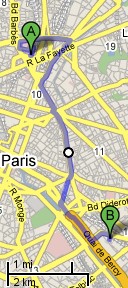 I had originally intended to travel from Paris to Florence by sleeper train, departing from the Gare de Bercy a whisker after 7pm, and to this effect, had booked a seat on the Eurostar arriving at the Gare du Nord just before 5:30pm. This, in theory, would have given me ample time to make my leisurely way through the Paris Métro, possibly grabbing a bite to eat, before boarding my train. In reality, it turned out that the Channel Tunnel wasn't feeling well that afternoon, and the Eurostar spent some 80 minutes waiting in the Kentish countryside, consequently arriving in Paris just before 7. A mad dash in a taxi with a driver who spoke no English ("Parlez-vous Anglais?", I enquired on entering the cab; the driver reply, buttered with no small amount of self-satisfaction, was, "Parle Français.") resulted in my arriving at Gare de Bercy (a good 5km away) some ten minutes after the Florence train's departure.
I had originally intended to travel from Paris to Florence by sleeper train, departing from the Gare de Bercy a whisker after 7pm, and to this effect, had booked a seat on the Eurostar arriving at the Gare du Nord just before 5:30pm. This, in theory, would have given me ample time to make my leisurely way through the Paris Métro, possibly grabbing a bite to eat, before boarding my train. In reality, it turned out that the Channel Tunnel wasn't feeling well that afternoon, and the Eurostar spent some 80 minutes waiting in the Kentish countryside, consequently arriving in Paris just before 7. A mad dash in a taxi with a driver who spoke no English ("Parlez-vous Anglais?", I enquired on entering the cab; the driver reply, buttered with no small amount of self-satisfaction, was, "Parle Français.") resulted in my arriving at Gare de Bercy (a good 5km away) some ten minutes after the Florence train's departure.
Facing the prospect of spending a night in a hotel room, I inquired at the ticket office about subsequent trains. Luckily, there was a sleeper train to Zurich (or, more precisely, to Chur via Zurich), and thence I could catch a train to Milan the following morning, putting me on the way toward Florence, at the cost of only around £90 and some eight hours of time.
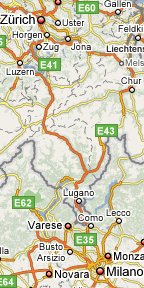 This, however, turned out to be well worth it, as the scenery along the Zurich-Milan route was spectacular. The morning's train wound past silvery alpine lakes fringed with small, white houses and corkscrewed its way up mountains to St. Gotthard's Pass, before entering a tunnel. On the other side, everything was different: the climate, the architecture, even the language. We had left the German-speaking part of Switzerland and entered the Italian-speaking part, a somewhat sunnier, though still impeccably well-organised, place. The train headed south, then stopped for some time at the border as border guards boarded to check our passports. Then it proceeded southward, past Lake Como, and towards Milan. From Milan, I made my own way south.
This, however, turned out to be well worth it, as the scenery along the Zurich-Milan route was spectacular. The morning's train wound past silvery alpine lakes fringed with small, white houses and corkscrewed its way up mountains to St. Gotthard's Pass, before entering a tunnel. On the other side, everything was different: the climate, the architecture, even the language. We had left the German-speaking part of Switzerland and entered the Italian-speaking part, a somewhat sunnier, though still impeccably well-organised, place. The train headed south, then stopped for some time at the border as border guards boarded to check our passports. Then it proceeded southward, past Lake Como, and towards Milan. From Milan, I made my own way south.
I had been planning to take this journey again at some point, the next time actually breaking it in the Swiss Alps; getting off the train somewhere around, say, Arth-Goldau or so, and spending a day or two there, in alpine tranquility. Though, when I recently looked at seat61.com, I found that that is no longer possible, having fallen victim to the onward march of progress:
The convenient direct sleeper train from Paris to Landquart & Chur was sadly withdrawn with the opening of the TGV-Est high-speed line in June 2007I wonder how many other sleeper train services have disappeared over recent years, squeezed by the boorish onslaught of cheap flights on one hand and the march of high-speed rail on the other, and whether this is a one-way process, or whether there are any new overnight services being introduced as old ones are dropped. One would think that they could run some through the Channel Tunnel at night. (Perhaps if Deutsche Bahn get rights to run services through the tunnel from 2010, as they have applied to do, they will put some in. After all, Germany is considerably further from London than Paris or Brussels, and an overnight train from London to Berlin, the showpiece rail hub of central Europe, could be popular. And then there were the overnight services from the north of Britain to Paris that were mooted when the tunnel was being built and flights were relatively expensive.)
2008/2/27
Blogging has been sparse over the past few days, as Your Humble Correspondent has been away in Berlin.
Anyway, a round-up of things I've noticed from while I was away:
- After the European University in St. Petersburg, Russia, got involved in an EU-funded project to ensure the fairness of the election process, the Russian authorities shut down the university, claiming that it is a "fire hazard". Opposition figures accuse the Kremlin of moving Russia back towards totalitarianism (or is the goal a Singapore-style "managed democracy"?)
- While we're on the subject of democracy, Charlie Stross weighs in on why forms of democracy are becoming increasingly prevalent these days, with even otherwise illiberal regimes adopting aspects of democracy, rather than autocratic systems.
Anyway. Here we have three ways in which democracy is less bad than rival forms of government: it usually weeds out lunatics before they can get their hands on the levers of power, it provides a valuable pressure relief valve for dissent, and it handles succession crises way better than a civil war.
- Barack Obama, it seems, is doing well in the US primaries; so much so that someone in the Clinton campaign seemingly decided to resort to dog-whistle politics and took it upon themselves to circulate photos of him wearing scarily Middle-Eastern-looking attire, in the hope that enough Texans are sufficiently prejudiced to be unable to vote for someone whose name not only sounds like "Osama" but who once wore similar headgear.
- After writing a piece on the mainstreaming of neo-folk music, Momus has discovered Emmy The Great. His great revelation has little to do with her music, mind you, and much to do with her being young, (half-)Asian and fanciable.
- Apple have finally released a new MacBook Pro. It gets the Air's multi-touch trackpad, and the usual quantitative bump in specifications, alas, a higher-resolution screen isn't isn't among them, so if you want 1600 pixels across on something that doesn't look comically oversized, you'll have to buy a Windows machine.
- Meanwhile, Microsoft have been slapped with a US$1.4bn fine by the EU, as well as having made vague promises of being more open in future, and apparently they're working on a Windows Vista-based GNU rival named UNG ("just like GNU, only without all that pesky freedom").
Berlin, for what it's worth, was great; four days, though, is nowhere near enough time to see everything and enjoy the city. Though I was surprised that the attendants on the Deutsche Bahn sleeper train didn't seem to speak English. Hopefully they'll remedy this by the time they start running services through the Channel Tunnel.
For what it's worth, photos are being uploaded here.
2008/2/14
The Guardian's latest blogger is the 19-year-old son of a travel writer, who looks like a character from Nathan Barley and will be writing up his gap year holiday to India and Thailand.
At the minute, I'm working in a restaurant with a bunch of lovely, funny people; writing a play; writing bits for Skins; spending any sort of money I earn on food and skinny jeans, and drinking my way to a financially blighted two-month trip to India and Thailand. Clichéd I know, but clichés are there for a reason.
I'm kinda shitting myself about travelling. Well not so much the travelling part. It's India that scares me. The heat, the roads, the snakes, Australian travellers. Don't get me wrong, I'm excited. But shitting myself. And I just know that when I step off that plane and into the maelstrom of Mumbai - well, actually, I don't know how I'll react.
Anyway, I've had to get malaria tablets, purchase travellers' cheques, sort out travel insurance, try and find a universal bloomin' plug, buy a backpack, get iodine drops (whatever they are) and enjoy dozens of injections off a nurse who was grumpy and trying to get me to pay a hundred quid to minimise the after-effects of being bitten by a monkey. I still fancied her though. She was a nurse.And in the comments, mayhem has ensued as the Graun's peanut gallery takes him to task for being upper-middle-class/derivative/a smug twat and having only landed this job by virtue of nepotism; some people speculating that Chris Morris and/or Charlie Brooker are responsible.
Here's an idea, Max. Instead of setting off on yet another inane, identikit trip around Asia before you take up your place at Oxbridge (or wherever), why don't you leave your family's Highgate mansion FOR GOOD, cut yourself off from your father's allowance, move into a council estate in Salford, STAY THERE, and then consider writing a blog about your experiences.
As for skinny jeans , Max if ever you eat from the street you may wish you had something a little more baggy and easy to remove, alternatively you could take some nappies. I'm not sure that the street vendors take Amex though.
You can have your first ladyboy experience in Thailand, but maybe you won't journal that one, just look out for the adams apple.
Dear the Guardian, I spend my money on conventionally shaped trousers and other types of equally conventional clothing, food and beverages. My other outgoings include: mortgage, heating, electricity, sundries and entertainment. I commute to work, an experience which I sometimes find amusing but for the most part find an unpleasant grind which I attemt to ignore by listening to music or reading. I'm reasonably fortunate in that I can take about three weeks of holiday a year which I spend either visiting family or travelling abroad. Going abroad sometimes makes me nervous, as do many new experiences as I get older.
Can I have a blog too?
Hey everyone, I'm Max's friend and he's a real genuine guy and a dude with a passion for travel writing and writing in general. So go easy on him until you hear what he has to say. I guarantee you'll be impressed. And who knows, you might want to visit some of the places he's visited because you heard about it from this blog.
So what if he wears skinny jeans? All us kids do these days, don't hate us because you're old!
Oh, and he co-writes Skins, so he's obviously a real talent. AND he doesn't take any money from his parents at all, he shops at charity shops and everything.
My names Peter Getkahn, at 19 I got a job in a Meat Factory to help pay for my Education. You can't follow my career on a blog, because my Dad doesn't work for the Guardian.
He'll definitely find himself, every 'traveller' he meets will be exactly like him.
2007/12/21
At the stroke of midnight last night, nine new countries joined the Schengen Zone, the area in Europe without any internal borders. The zone now extends well into eastern Europe, encompassing the former Eastern bloc nations and ex-Soviet Baltic states which joined the EU in 2004, and going right up to borders with Russia and the Ukraine.
The other side of this has been a fortification of the Schengen zone's new easternmost frontier, with intensive patrols and high-tech sensors being deployed to prevent illegal immigration from (or through) their eastern neighbours.
2007/11/6
With the completion of the new high-speed rail corridor for Eurostar, Britain has finally joined the European fast rail party. Or, more precisely, the south east of England has, as the rest of the country stares forlornly at the Eurostar passing it by and/or books another Ryanair flight:
This marks a kind of betrayal. When, 21 years ago, François Mitterrand and Margaret Thatcher signed an agreement to build a rail tunnel between the UK and France, the benefits for South-east England were to be shared with the rest of Britain by virtue of a range of regional services. Plymouth would enjoy an overnight link with Brussels, while travellers from Cardiff could catch a train direct to Paris.
Over the years, this pretence was maintained at vast expense: rolling stock for Eurostar Regional was built; a catering shed was constructed at Manchester Piccadilly; and timetables at Edinburgh Waverley showed the schedules for a couple of seasons.
The result of this development will be clearer later this month, when the new high-speed Eurostar train service beds in. After an encouraging (but very brief) northbound start, it will swerve east, cross the East Coast main line and disappear into a hole in the ground. This, the "London Tunnel" , emerges 11 miles later in the Labour-voting wastes of southern Essex – an eccentric route reached following a political decision by the last Conservative government, keen to avoid upsetting the voters in key Kentish constituencies.The new link—dubbed, perhaps optimistically, "High Speed 1"—will allow trains to travel between London and the Channel Tunnel at 186mph (or 300km/h, if you're European), bringing the Continent a lot closer (the French port of Calais is now just under one hour out of London, which would (passports and ticket costs notwithstanding) place it within London's commuter belt). Once you're at Brussels-Midi, Europe's existing high-speed rail network (funded by wasteful Eurosocialist largesse in place of the British penny-pinching that's efficiently packing commuters in like sardines as it squeezes the last bit of utility out of the nation's creaking railway infrastructure) will take care of the rest. And as Europe gets closer, destinations in Britain get relatively more distant:
With trains to Brussels taking only 111 minutes, Norwich, Cardiff and Exeter share the ignominy of longer journey times. While the fastest trains to Leeds and Manchester narrowly beat those to Paris, the cities of Sheffield and Liverpool take longer to reach than the French capital.
Hull will suffer the ignominy of taking exactly the same length of time to reach from St Pancras as Disneyland Paris (and being considerably less fun when you get there).
Two locations are tantalisingly just three minutes over 10 hours away: Fort William in the West Highlands of Scotland, and Berlin. Given the investment pouring into rail at the heart of Europe, Germany's capital will beat the 10-hour barrier well before the western end of the Caledonian Canal – which relies on rail infrastructure almost as old as the inland waterway.The article concludes with a list of the "20 top new rail destinations" on the Continent, each with an equivalent UK trip; Brussels is twinned with Bristol, Lyon with Glasgow, and Cologne (in the German hinterland) with Aberystwyth. The French Riviera is now officially closer than the Welsh Riviera.
There are vague noises about linking London to Birmingham by high-speed rail (that's the European definition of "high-speed", not the feeble local substitute). As for anywhere further north; forget it. It's unlikely that anyone living today will see a 300km/h rail link between London and Scotland (one such idea was floated a while ago, before being scrapped in favour of the more "sensible" alternative of making do with what we have). Then again, maybe if the oil crash really bites and cheap flights evaporate, priorities will shift somewhat.
Another unanticipated consequence of the shift in effective distances may be an undermining of Britain's traditionally isolationist outlook. When the north of France is firmly in the London commuter belt and moneyed Londoners start considering making homes there, will they stand for spending an hour each day going through passport control? There could be new pressure to get Britain to sign the Schengen treaty and abolish border controls with the EU. Granted, the counter-pressure from the Daily Mail Little Englanders, with their visions of dirty hordes of disease-carrying paedoterrorist welfare cheats at the inadequately fortified gates, is a pretty solid obstacle, though whether it will be so in a generation's time is an open question. Perhaps the Channel Tunnel will have turned out to be the trojan horse Mitterrand intended it as?
2007/11/5
Charlie Stross has written a travelogue about Japan. As with most, nay, all of his stuff, it is very much worth reading:
You can wander into a Japanese department store and lose an entire day, without even scraping the surface of the mall it's embedded in. My personal nemesis is Yodabashi Camera: a department store that has a clothing and houseware department embedded in it where most such shops would feature an electronics boutique department. Half of the sixth floor of its Yokohama branch is given over to capsule toy vending machines, where for 200 yen (about 80 pence) you can turn the knob and acquire a tennis ball sized bundle of mysterious plasticky goodness with a model kit of some complexity within. My favourite (which Feorag acquired from a capsule toy machine at Puroland, of which more later) is a capsule toy that contains a self-assembly model of a capsule toy machine, complete with tiny capsule toys ready to vend. Even the toys teach recursion ...
Tokyo is ... well dammit, I only spent four days there and you expect me to describe it? Tokyo left me feeling like an illiterate Albanian shepherd teleported without warning to the UK, staring slack-jawed in wonder at the vast, gleaming, powerful public works of metropolitan Huddersfield, reeking of wealth and efficiency and a goat-free future. From the thirty-seventh floor of a skyscraper I looked out across the high rise skyline, red lights blinking fretfully in the grip of a typhoon as winds strong enough to blow sheets of rain up the glass of the window rumbled around me, and I realized: this future has no place for goats.
Kyoto, the former imperial capital, looks like just another modern Japanese city at first. But then, as you're walking through a shopping arcade that specializes in commercial catering supply shops (such as the shop that sells nothing but cash registers, or the signage supplier), you spot a gap between two stalls — and plugging it, the courtyard of an ancient Buddhist temple, sharing a cigarette with the high wooden archway of a Shinto shrine. There's a sign in front, with an English translation, so you pause to read it. "Founded by the abbot ... around 768 ... burned down during the wars ... this is a modern reconstruction ..." And you're about to walk away, disappointed, when you read the final words: " ... created in 1633." It's just as much a modern replica as the Christopher Wren reconstruction of St Paul's Cathedral — and yet, the same language is used of reproduction castles cast in the concrete of 1930s modernism, or Buddhist temples from the fourteenth century.
These living conditions place a mold around the behaviour of the people who live with them. Take the wearing of uniforms, for example. In the UK, with a few exceptions — the uniformed services of government, police and military and fire services — we respond poorly to being placed in a uniform; it's a sign of depersonalization, stripping us of individuality. In Japan, however, uniforms are everywhere. Even people who don't have to wear them seem to gravitate towards workwear that's uniform in its appearance: taxi drivers in dark suits, peaked hats, and white gloves. Uniforms confer status — a uniform is a sign that you belong to some greater social context, to a corporation or a shop or a school or something important.(The last part makes a similar point to Momus' essay on "superlegitimacy".)
On a tangent: Earthquake sets Japan back to 2147.
2007/11/4
A new study has discovered the phenomenon of suicide tourism, which involves people committing suicide choosing to do so at or near iconic landmarks or historic locations, and travelling to do so. The study claims that one in every 10 suicides in Manhattan is by an out-of-towner who travelled to the city expressly to die:
Some 274 suicides by non-residents were recorded in Manhattan between 1990 and 2004, more than half of them as a result of long falls from bridges and high-rise commercial buildings, including hotels, according to the report.I once read that luxury hotels are a big suicide magnet, with many treating themselves to a luxurious exit, though this is the first time I heard of suicide tourism as such (not counting specific examples, such as various bridges).
2007/11/2
In a few years, there may be direct trains from London to Germany; Deutsche Bahn is applying to run trains through the Channel Tunnel to St. Pancras. Eurotunnel, who own the tunnel, are apparently keen for them to do so, being considerably in debt and having capacity to spare. There remains a question of safety standards, though, which DB may want amended somewhat:
At present, passenger trains using the tunnel have to be capable of being divided in two in the case of a fire. The safety rules also require operators to use a special locomotive capable of coping with the signals and power supply on both sides of the Channel. Under European Union open access rules for railways, the £5.7 billion High Speed One, due to open in a fortnight between the Channel Tunnel and St Pancras, has been built to accommodate trains from across Europe.If DB get permission to run services to London, trains could reach Cologne in 4 hours and Frankfurt in under 5. The article doesn't say whether all services would be during daytime hours (as are the current Eurostar services, which, after all, are considerably shorter in duration) or whether there would be overnight sleeper trains from London to the heart of Europe.
2007/11/1
Seen in a Times piece on amusing signs around the world, this sign is in Pune, India:
They do seem to have an appreciation of the full breadth of the English language in Pune.
2007/10/1
The Lonely Planet publishing company, best known for its travel guides (as well as random travel-related books and a stock photography library) has been bought — by the BBC, of all people. Well, by BBC Worldwide, which is the BBC's commercial arm (the one which sells BBC content to non-licence-fee-payers outside the UK for profit).
BBC Worldwide international director Ian Watson said there was "absolutely no intention" of introducing advertising into Lonely Planet, which he described as "the most important brand to travellers around the world". "One of the things we very quickly got to talking to with Tony and Maureen was just how closely aligned our editorial values are," he said.The BBC is mooting expanding Lonely Planet's online services and creating TV programming based on the guides. The Lonely Planet offices remain in Footscray (which, for the Britons reading this, is sort of the Melbourne equivalent of Hackney or somesuch), and the management remains unchanged.
2007/7/10
Some miscellaneous web links from today:
- Scientists in Britain have developed a robot for teaching social skills to autistic children. The robot, named KASPAR (presumably a reference to Kaspar Hauser) can smile, gesticulate and simulate emotions such as surprise and sadness and acts as a "social mediator".
- A taxonomy of terrorist group logos, taken from Wikipedia. There are a lot of swords and AK-47s there, along with a few stars (mostly from the Marxist-influenced, rather than nationalist or Islamist, groups).
- In a year's time, Israel will have a national internet censorship firewall, blocking all adult content, with those wishing to access it being able to do so by signing a "perverts' register". If the Israelis make this work, there'll probably be pressure in Australia to implement something like this (after all, there is theoretical bipartisan support for a national firewall).
- A WIRED article looking at the subculture of people who deliberately try to fly as many miles as possible for the lowest price, and the strategies they employ.
(via Boing Boing, /.) ¶ 0
2007/4/25
A Commons inquiry into whether flying has become less pleasant has been told that flights with budget airlines are unpleasant, because of the quality of the passengers they attract:
He read out one description, saying the experience could be summed up as "very unpleasant, a good proportion of people shout the length of the cabin, walk around with drinks, use foul language and are generally awful".The representatives of two budget airlines, EasyJet and FlyBe, denied suggestions that they tolerate a poorer standard of behaviour than more expensive airlines. Though, if there is a correlation between the costliness of a journey and the standards of behaviour the travellers (consciously or subconsciously) believe is expected of them, what the airline will tolerate is beside the point.
Assuming that there is more bad behaviour on budget flights, I wonder what proportion of that is due to not so much the social class/lack of proper upbringing of the passengers as the context of the situation: in other words, some people who would otherwise behave respectably assuming, consciously or otherwise, that, since they're on a budget flight, the expected standards of behaviour are a lot lower than elsewhere. Call it a transport-related variant of the broken windows theory.
2007/3/28
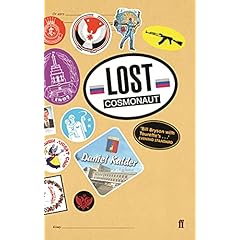 A few days ago, I was at Fopp near Covent Garden, where I found an interesting-looking book titled Lost Cosmonaut, by one Daniel Kalder. I picked up this book, along with a handful of others, and over the next few days, read it, finding it fascinating.
A few days ago, I was at Fopp near Covent Garden, where I found an interesting-looking book titled Lost Cosmonaut, by one Daniel Kalder. I picked up this book, along with a handful of others, and over the next few days, read it, finding it fascinating.
Lost Cosmonaut is a travelogue around various far-flung parts of Russia, with a difference. For one, in the spirit of what he calls "anti-tourism", the author eschews the exotic, beautiful or spectacular, instead seeking out the mundane, boring and depressing. The book starts with an anti-tourist manifesto, titled the "Shymkent Declarations", declaring the Taj Mahal, Great Wall of China and Pyramids of Egypt to be "as banal as the face of a Cornflakes packet", and that the true unknown frontiers lie in the "wastelands, black holes and grim urban blackspots" of the world. The book itself follows in this vein, as the author (a somewhat sardonic Scotsman) visits four parts of Russia's ethnic republics where no tourists normally go, and describes them and the people with great wit and some embellishment. At times it verges on a sort of Borat-esque poverty porn, finding humour in the grimness of it all (and one of the people he talks to, an Udmurtian actress, actually accuses him of this), though the book transcends this, casting a more philosophical eye at the world: in many places, Kalder speculates on the myriad of small secrets in the various distant corners of the world, the minor triumphs and lesser geniuses whose works will be lost to obscurity, the languages and cultures dying out and falling out of living memory, and comes close to funding a sense of wonder in the mundane and bleak. Such flights are usually followed by wry illustrations of the general shittiness of the particular place he is currently visiting.
In the book, he visits four places, all of which are technically within the European part of Russia, though are, to varying extents, culturally alien to most Westerners' idea of Europe (glass buildings and Ikea furniture, as he puts it). He visits Kazan, once the glorious capital of the Tatars, since destroyed several times over and now rebuilt as a typically grim Soviet provincial city (and at the end speculates that perhaps the original Kazan is better off razed, because that way it can never decline into a tawdry tourist cliché), the Kalmykian republic (which is run by an eccentric despot who is obsessed with chess, and quite possibly murderously corrupt), Mari El (centre of the mail-order bride industry, in whose forests an ancient pagan faith still flourishes, or at least several half-complete reconstructions of one do), and finally Udmurtia, whose population has been so thoroughly assimilated into Russia that nobody knows exactly what the indigenous culture was like.
2007/3/21
As part of an ambitious plan to divert all cross-country freight onto the railways, the Swiss are digging a railway tunnel under the Alps. The tunnel, which (at 57 kilometres) will be the world's longest, will form part of a new, faster railway link between Zurich and Milan, and make crossing the Alps quicker and easier than it has ever been:
A key feature of the project, which is new to alpine transport, is the fact that the entire railway line will stay at the same altitude of 500 metres (1,650ft) above sea level.
This will allow trains using the line to reach speeds of 240km/h (149mph), reducing the travel time between Zurich and Milan from today's four hours to just two-and-a-half. That would make the journey faster than flying.
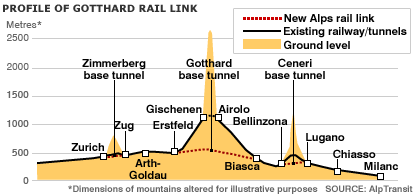 Whilst initially intended for freight, the service is expected to carry passenger trains; an underground railway station has been established one kilometer beneath the village of Sedrun, for use in the construction project, and there are plans to turn it into a passenger station, to be known as "Porta Alpina", or "gateway to the Alps":
Whilst initially intended for freight, the service is expected to carry passenger trains; an underground railway station has been established one kilometer beneath the village of Sedrun, for use in the construction project, and there are plans to turn it into a passenger station, to be known as "Porta Alpina", or "gateway to the Alps":
Tourists will be able to arrive by train in the Alps in record time, and then be whisked up to fresh mountain air by way of the world's longest elevator.On one hand, travelling to the Alps by high-speed train, ascending in a lift and emerging in a tiny Alpine village does sound cool. On the other hand, I had the good fortune to travel from Zurich to Milan by the slow way—the train winding around the sides of silvery lakes, crossing bridges over valleys and corkscrewing its way up the Alps on the German-speaking part, going through a (relatively) short tunnel at St. Gotthard's Pass, and then coming back down on the Italian-speaking part, with its entirely different architecture and vegetation, and that was (as you can undoubtedly imagine) a magnificently scenic journey. A tunnel just wouldn't be the same.
2007/3/13
Environmental campaigners are livid after it emerged that a British airline has been flying empty planes between London and Cardiff, purely to hold onto valuable slots for flying in and out of Heathrow. British Mediterranean Airways originally used the slots for flights to and from Uzbekistan, which were suspended after unrest there. Since October, it has, instead, been flying empty planes between the two airports six days a week, with each flight pumping more than five tonnes of carbon dioxide into the atmosphere.
2007/1/19
Blogging has been somewhat sparse, as I've been travelling around Australia without a working laptop. (I started off travelling with a working laptop, but it died along the way.) It will resume shortly.
For what it's worth, I visited Melbourne and (briefly) Sydney, catching up with family and friends, seeing a few bands and buying lots of CDs. There are photos on my Flickr page.
2006/12/19
I am writing this entry in Melbourne, having returned for a visit, my first in one and a half years.
A few days ago, I caught a flight from London. This time, I eschewed the usual Qantas/British Airways and flew with Emirates, going via Dubai and (briefly) Singapore. I'll probably fly with them again; the experience was, for the most part, very good. The food and service were of quite high standards, but most impressive was the ICE entertainment system on the London-Dubai leg of the flight. It had over 500 channels, including on-demand movies (all of them pausable/rewindable; something which makes a big difference when the staff come around to serve drinks), a pretty large library of music, and a selection of video games, some of which are playable against other passengers. (The trivia game is particularly suited to this, even if the questions are a bit US-centric.) The selection of music is worthy of note; the channels included the usual pop, alternative, classical, jazz and chill-out, along with an extensive selection of world music (J-Pop and K-Pop, European chart hits, classical and contemporary Arabic music and Bollywood-style music), a selection of "classic albums", and a repository of every UK number one hit since the 1950s. As well as this, there were two video channels displaying the view from two external cameras at the front of the plane, one looking forward and the other looking down. This was quite interesting (especially when landing), even though the cameras didn't perform very well after dark.
The entire system seemed to be implemented on the same operating system as the entertainment systems used on Qantas and BA flights; for example, the real-time flight map seemed to be identical, except for the languages being English and Arabic, and Emirates having the somewhat annoying habit of interspersing promotional slides between map slides. This system appears to consist, from what I can determine, of a central computer connected to one or another type of video source (a rack of old-fashioned videotape players on older aircraft or a hard-disk-based system on newer ones) and a few hundred terminals consisting of NTSC monitors and controls. Unfortunately, the ICE entertainment system has not been rolled out across all aircraft, and so 2/3 of the trip (i.e., everything from Dubai onward) only had the old system, consisting of several non-interactive video and audio channels.
I managed to see a few films on the flight: I caught Thank You For Smoking (a cynical US indie film about a tobacco lobbyist; somewhat similar in tone to Wag The Dog), and The Illusionist (a thriller about an illusionist involved with the rather nasty Austro-Hungarian Crown Prince's fiancee; it was a nice mood piece, though the details of his art were treated as an opaque plot device and not elaborated upon). Towards the end of the journey, I also saw and episide of Derren Brown's show and most of Disney/Pixar animation Finding Nemo, confirming that Andrew Bolt was on crack when he wrote about it being leftist propaganda.
The only downside to the flight was the fact that, from Dubai onward, I was seated next to a large woman who was in the habit of surreptitiously lifting the armrests and spilling over into her neighbours' seats. Such, I suppose, are the travails of not being fabulously wealthy and able to afford to fly business class.
As for Melbourne, it seems to be still here, largely unchanged. For one, I am relieved to see that the Giuliani-style sanitisation of the CBD seems to be largely a myth, at least judging by the abundance of stencil art in various laneways. Either that or they dropped the policy after the Commonwealth Games were out of the way.
2006/10/26
The Graun has sent three of its journalists from London to various holiday spots—Thailand (via the Trans-Siberian/Mongolian railway and then through Vietnam), Egypt (through Venice and the Balkans to Cyprus, then doubling back through Syria) and Ibiza— without flying. The resulting journeys were much longer and more expensive, though also considerably less environmentally damaging; each one was invariably more of an experience than sitting on a plane (which sometimes meant an adventure of unforeseen hassles and at other times a more enjoyable and pleasant travelling experience than cramming into a Ryanair air-coach for a few hours).
When I travel by plane I never talk to anyone, mainly because air travel puts me in a mood that would impress Naomi Campbell. If I travelled everywhere by train, I realise, I would be a veritable international social dynamo.
This has been, without a doubt, the best journey abroad of my life and I am seriously considering, with the exception of work trips, never taking a plane again within Europe. How often do you remember flights that you have taken, other than for negative reasons? Instead, it all becomes another few hours of your life that you have lost. So although travelling by train and boat took more time in the literal sense, because I'll remember every moment, it seems to me to be less of a waste of it.For those who are interested in travelling from anywhere to anywhere (well, OK, from London to anywhere) without flying, The Man In Seat 61 has some useful resources.
2006/10/23
This blog has been quiet over the past few days because your humble correspondent has been in sunny Reykjavík, Iceland for some two and a half days.
I found Reykjavík to be a very pleasant and interesting place, which manages at once to be small and cosmopolitan. But more impressions later.
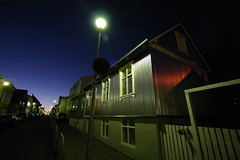 Over this weekend, I managed to take a lot of photos (which are making their way here), to see a few gigs (including a Jens Lekman solo set and the first Ninetynine gig I've seen since leaving Australia), pay through the nose for a glass of Viking lager, drink a coffee in Kaffibarinn whilst Architecture In Helsinki played on the PA, and visit the Blue Lagoon (which is highly recommended). And I managed to find a DVD of a brilliant Icelandic film I saw at the Melbourne Film Festival some years ago, "Englar Alheimsins"; there seems to be nowhere outside of Iceland that is aware of this DVD existing, whereas when you walk into Skífan (which is apparently Icelandic for "HMV"), you find a raft of copies in the Icelandic film section, all with optional English subtitles. Go figure.
Over this weekend, I managed to take a lot of photos (which are making their way here), to see a few gigs (including a Jens Lekman solo set and the first Ninetynine gig I've seen since leaving Australia), pay through the nose for a glass of Viking lager, drink a coffee in Kaffibarinn whilst Architecture In Helsinki played on the PA, and visit the Blue Lagoon (which is highly recommended). And I managed to find a DVD of a brilliant Icelandic film I saw at the Melbourne Film Festival some years ago, "Englar Alheimsins"; there seems to be nowhere outside of Iceland that is aware of this DVD existing, whereas when you walk into Skífan (which is apparently Icelandic for "HMV"), you find a raft of copies in the Icelandic film section, all with optional English subtitles. Go figure.
I really enjoyed visiting Reykjavík, and intend to go back. Next time I'll probably stay for longer than a weekend, and travel around a bit more. And probably will catch a later flight out than the 7:15am one.
2006/9/20
25 years ago this Friday, France opened its first TGV train line, from Paris and Lyons. The arrival of the high-speed train lines (which now run at up to 320km/h, nearly twice as fast as the fastest train in Britain) has profoundly changed the psychogeography of France, effectively shrinking the country to a more conveniently traversable size:
The 1,250-mile (2,010km) TGV network, a product of the French tradition of centralised power and state engineering, has transformed life, bringing cities such as Tours, 230 miles from Paris, within commuting range. A daily season ticket on that TGV route costs £390 a month. Between Paris and Lille (127 miles each way), daily commuting costs £415 a month. Vendôme, 260 miles to the southwest of the capital, has become a dormitory town. About 400,000 people use the TGV for daily work.
"The TGV is the Concorde plus commercial success," Clive Lamming, a railway historian who wrote the Larousse des trains et des chemins de fer encyclopaedia, told The Times. "The TGV has virtually reduced France to one big suburb. This has increased the independence of businesses from Paris. Workers are more mobile and their costs are less."To commemorate the 25th anniversary of the Paris-Lyons TGV line, the SNCF (France's state railway company) is opening the new TGV-Est line from Paris to Strasbourg, which will make the journey in 2 hours and 20 minutes (it is presently 4 hours).
It is unlikely that anything like the TGV will happen in Britain. The technical efficiency of the TGV is a result of the sort of overengineering that happens in systems shielded from the ruthless optimisations of the marketplace. In Britain, however, where the railways are privatised and the maximisation of profits and cutting of expenses is paramount, the system would never be so uneconomical as to invest in dedicated high-speed railway lines which inefficiently lie idle when not being traversed by high-speed trains, rather than being used for goods and short-distance traffic. And then, of course, there is the proud Anglo-Saxon tradition of underinvestment in infrastructure to uphold.
2006/9/5
What's the UK's favourite tourist city these days? No, it's not London. Nor is it Edinburgh. It's Glasgow.
Conde Nast said Glasgow had been singled out for its people and hospitality as well as its lively nightlife.I wonder whether a perceived higher risk of terrorist attacks in the capital had anything to do with this.
2006/8/8
Over the past few weeks, Dorothy Gambrell (who draws Cat and Girl, an amusing and thought-provoking web comic (though somehow that wasn't enough to get her into the Belle & Sebastian tribute graphic novel)) has been travelling on container ships across the Pacific, from San Francisco Bay to Tokyo, Osaka and Kaohsiung, Taiwan. She has now returned and posted photographs:
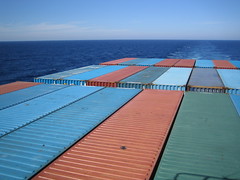
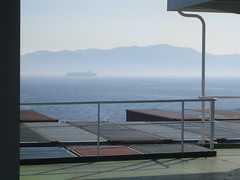
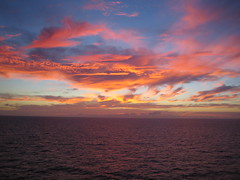
2006/6/21
I'm back in London now, having spent the past five days on the continent, catching the Eurostar to Paris, then travelling via Zürich to Tuscany, staying for a few days in the mediaeval hilltop town of Cetona, then back to Paris via Florence and back to London. Photos from my travels will gradually filter onto Flickr.
Some observations:
- The Eurostar train to Paris was delayed by 80 minutes; it seems that the tunnel wasn't feeling well or something, and the train had to wait outside whilst its handlers coaxed it into cooperating. Consequently, I missed my initial connection, the 19:06 sleeper to Florence, despite a white-knuckle taxi ride through the Parisian rush-hour traffic. The moral of this story: allow more than one hour and 40 minutes between the Eurostar and anything departing from Gare de Bercy.
- I did manage to get a bunk on a later sleeper to Zürich, and a connecting train to Milan. The Zürich train (a French SNCF service) was relatively empty, and even in second class, quite comfortable.
- The Swiss love their sans serif typefaces and clean design, and have some of the best-looking banknotes I have seen. They're about as colourful as Australian banknotes, only with more of a modernist European graphic-design feel.
- The journey through the Swiss Alps from Zürich to Milan is probably the most scenic railway journey I have been on; the train climbs into the alps, winding around hills and going through tunnels, passing vast, mirror-still lakes and small towns. Then it goes through a tunnel near St. Gotthard's Pass, and comes out in the Italian-speaking part of Switzerland, which has a completely different climate, geography, architecture and character, seeming rather Mediterranean. I have added Switzerland to the list of places to visit.
- Swiss trains are very clean and run like clockwork. Italian trains are generally of a high standard. The "EuroStar Italia" trains (which are similar to French TGVs or Virgin Pendolinos) are fast and come with an onboard magazine (in Italian) and radio channels in the seats (which didn't seem to be working), and the "InterCity" trains (expresses pulled by more conventional electric locomotives; virtually all railways in Europe are electric these days) are air conditioned and clean. First class on those costs slightly more than second-class and gives you larger-looking seats (though they have the same number of them in the compartments) and power points near the window seats. (The EuroStar to Paris also had power points (European ones, not British ones), though the returning one didn't.)
- The "Palatino" sleeper from Florence to Paris is quite popular, and consequently the compartment I was in was full. Fitting into a second-class sleeper compartment (which holds six) with baggage is a bit of a juggling act. Apparently first class sleepers are said to be much more comfortable.
- Most if not all of the native English speakers one meets whilst travelling on trains through Europe are Americans. I wonder why this is; perhaps it's because Britons associate trains with day-to-day drudgery and avoid them whilst on holidays, whereas Americans regard them as part of the European experience.
2006/4/28
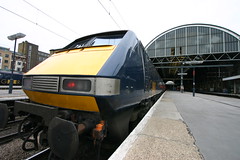 Your Humble Narrator is presently sitting aboard a train from London to Glasgow, in the first-class compartment. First class doesn't cost all that much when booked in advance, and has privileges, not least among them free wireless internet throughout the four-and-a-bit-hour journey. The quality of the internet access is mostly usable, though somewhat patchy; speed is, from memory, comparable with dialup, and long file transfers (such as Flickr photo uploads) sometimes time out; other than that, the service is quite usable. The other benefits of GNER first class are somewhat fewer than they were on Virgin: a GNER first-class ticket won't get you complimentary food other than biscuits, or any drinks other than tea, coffee or juice. The seats are comfortable, though, and the power points seem to work throughout the journey (on some other trains, I've found my laptop running off battery power an hour into the journey, despite being plugged in).
Your Humble Narrator is presently sitting aboard a train from London to Glasgow, in the first-class compartment. First class doesn't cost all that much when booked in advance, and has privileges, not least among them free wireless internet throughout the four-and-a-bit-hour journey. The quality of the internet access is mostly usable, though somewhat patchy; speed is, from memory, comparable with dialup, and long file transfers (such as Flickr photo uploads) sometimes time out; other than that, the service is quite usable. The other benefits of GNER first class are somewhat fewer than they were on Virgin: a GNER first-class ticket won't get you complimentary food other than biscuits, or any drinks other than tea, coffee or juice. The seats are comfortable, though, and the power points seem to work throughout the journey (on some other trains, I've found my laptop running off battery power an hour into the journey, despite being plugged in).
Shortly after 10 and some distance out of Peterborough, the train stopped in its tracks outside a perfectly unexceptional-looking town, replete with industrial estates, big-box shopping centre and, in the distance, a church spire holding court over Victorian semi-detached chimney pots. An announcement came on on the PA, saying that the train ahead of ours on the line had collided with "a herd of cows", and the estimated time of departure was unknown. Half an hour later, workers apparently finished removing bits of hamburger from the tracks and the unfortunate train ahead managed to limp into the next station, Newark North Gate, and so we got moving, with the guards announcing that we will be making an extra stop at the next station to pick up passengers from the stricken train. The train is expected to be an hour late pulling into Glasgow.
2006/3/30
A recent issue of The Times has a fairly detailed section on rail travel today; this section includes a survey of the state of European rail travel (summary: it's enjoying a renaissance, thanks to Eurostar and environmental consciousness, likely to improve further when cheap flights dry up, though ticketing still has some way to go before booking international rail journeys is as easy as booking flights), a section on travelling across Europe on Inter-Rail passes (along with four recommended European rail journeys to make with one's pass), as well as articles on train travel in Italy and India, shinkansen journeys in Japan, the backpacker-infested Trans-Siberian Express (whose 1-week journey time, the previous article notes, could be slashed to 18 hours if it was rebuilt using maglev technology soon to be deployed in Japan), as well as various luxury train journeys, such as the current holder of the "Orient Express" trademark (an opulent art-deco train journey from London to Verona), the Canadian Rockies and opulent Hungarian luxury trains. Also, Australia's Adelaide-Darwin rail link gets a writeup, getting rather mixed reviews (apparently the "Darwin" terminus 18km from the city centre is an afterthought, the carriages aren't quite as luxurious as one would believe, and the ride is bumpy; not to mention the fact that, catering only to tourists (it's too expensive for casual commuters) and having no stations along the way, it's "not quite a proper train" compared to others).
For anyone wanting more information on rail travel in various parts of the world, there's always The Man In Seat Sixty-One, a (somewhat UK-centric) one-stop information shop for rail buffs and travellers with an aversion to air travel.
2006/3/28
Apparently they're upgrading the Melbourne-Sydney XPT passenger rail service. I hadn't heard much about it for a while; I heard a rumour that it was to be scrapped because everybody was choosing, instead, to fly for half the price and 1/5 or so of the time. The last time I caught it (in December 2003), I recall that there were quite a few empty seats, and most of the patrons were elderly people, rural commuters and one rather drunk bikie.
The Victorian and NSW governments are investing A$35M into the XPT, which apparently buys a new lick of paint, new furnishing for all carriages, and better refreshment and toilet facilities. (And, given that there's nothing in the news report about it shaving a minute off the 11 or so hours that a one-way journey takes, that's probably a good thing.) I suspect that the upgrade won't include power points in seats/tables (as, say, Virgin Trains in the UK have), as pensioners and bikies in rural Australia generally don't carry laptops.
Anyway, it's good to hear that the XPT is not only still kicking around but actively being invested in. When the oil crunch comes and the cheap flights dry up, it'll undoubtedly come in handy.
2006/2/15
A US company is building what could replace jet airliners: a new generation of massive, luxuriously appointed airships.
Unlike its dirigible ancestors, the Aeroscraft is not lighter than air. Its 14 million cubic feet of helium hoist only two thirds of the craft's weight. The rigid and surprisingly aerodynamic bodydriven by huge rearward propellersgenerates enough additional lift to keep the behemoth and its 400-ton payload aloft while cruising. During takeoff and landing, six turbofan jet engines push the ship up or ease its descent.
To minimize noise, the aft-mounted propellers will be electric, powered by a renewable source such as hydrogen fuel cells. A sophisticated buoyancy-management system will serve the same purpose as trim on an airplane, allowing for precise adjustments in flight dynamics to compensate for outside conditions and passenger movement. The automated system will draw outside air into compartments throughout the ship and compress it to manage onboard weight.It sounds good to me; add high-speed satellite-based communications and one has a rather pleasant (and less ecologically damaging) way to travel than current airliners. Whilst a trip would take longer, it would probably be more enjoyable and/or productive than sitting in an airliner seat.
(via Boing Boing) ¶ 1
2006/1/20
Rail fares in Britain are set to treble, as the Blair government plans to phase out cheap "saver" tickets, giving the privatised rail operators freedom to set their own fares. Rail fares in Britain are already staggeringly high compared to continental Europe, and have a hard time competing with flights; for example, the cheapest flight from London Heathrow to Manchester is £59 — less than £2 more than the equivalent Saver rail fare. Once Saver fares are abolished, the standard fare will be £202, and even people who prefer catching the train (for aesthetic or ecological reasons, for example) will be deterred from doing so. Could this be the end of rail travel in Britain?
2006/1/5
Things I didn't know until today: apparently, David McClymont, the bass player from the seminal early-1980s Scottish indie band Orange Juice, wrote the Lonely Planet book on Melbourne. (Or so someone claims on last.fm)
2005/10/31
Your Humble Narrator spent the past weekend in Manchester, visiting friends, catching the Architecture In Helsinki gig there, and seeing some of the sights.
Manchester appears to have an interesting stencil/paste-up art scene. There's even one artist whose thing seems to be gluing his canvases to walls/doorways, with "NOT FOR SALE" stickers underneath them (where, in a gallery, the price would go):
Apparently there's also a big electro-pop scene happening, continuing the Mancunian tradition of combining guitar-rock and dance electronics. There didn't seem to be anything of that sort happening on Saturday night though.
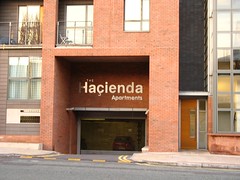 I did, however, see the Haçienda; or, rather, the Haçienda Apartments, a set of yuppie lifestyle apartments built on the site of FAC51, the famous club owned by Factory Records and New Order. Disappointingly, there did not seem to be a blue plaque anywhere on the building saying anything like "ON THIS SITE, THE FIRST DOSE OF ECSTASY IN BRITAIN WAS TAKEN (OR SO TONY WILSON WOULD HAVE YOU BELIEVE)"; the only testament to the site's significance is its name, stripped of concept and reduced to another couture marketing buzzword. (And it doesn't even look unusual, unlike North London's Visage apartments, which are apparently modelled on Steve Strange's hairstyle.)
I did, however, see the Haçienda; or, rather, the Haçienda Apartments, a set of yuppie lifestyle apartments built on the site of FAC51, the famous club owned by Factory Records and New Order. Disappointingly, there did not seem to be a blue plaque anywhere on the building saying anything like "ON THIS SITE, THE FIRST DOSE OF ECSTASY IN BRITAIN WAS TAKEN (OR SO TONY WILSON WOULD HAVE YOU BELIEVE)"; the only testament to the site's significance is its name, stripped of concept and reduced to another couture marketing buzzword. (And it doesn't even look unusual, unlike North London's Visage apartments, which are apparently modelled on Steve Strange's hairstyle.)
There is one remaining venue connected with New Order in Manchester: the Dry Bar on Oldham St. Though forget about it; it's not remotely interesting. The interior looks like a suburban pub (or, to the Australians in the audience, like a RSL club), and apparently it's full of lagered-up chavs on most nights.
There is a lot else to see around the Oldham St. part of Manchester (which is sort of like Byres Road, Glasgow, or a more grungy Brunswick St., Melbourne). The ubiquitous sticker/paste-up art, for one. The shopping's quite good, especially for records (because it's not London, second-hand CD shops tend to have more interesting selections at more reasonable prices). I ended up taking back as many CDs as I could fit in my backpack (roughly 15).
Affleck's Palace is interesting enough, but, one gets the feeling that it's nowhere near what it used to be. Nowadays it contains mostly teen-rebellion paraphernalia of the same kind seen in Camden Market. The various retro shops nearby (including the Pop Boutique, which is more impressive than their London outpost) have, alongside the usual selection of jackets and jeans, quite a few 8-bit computers and vintage video game units. (One shop had a working Amstrad CPC464 on display next to the 1970s shirts and fondue sets.)
2005/6/13
Your Humble Narrator recently travelled out of London and stayed briefly in the town of Brockenhurst, on the border of the somewhat misnamed New Forest.
Brockenhurst is a small country town in Hampshire (south-west of London); it either is or was cattle-farming country; at any time, there are cows and horses wandering about, and streets are fitted with strategically-placed cattle grids (as are many driveways). I was struck by how similar it looked to Australian country towns; of course, Australia got its agricultural and civic traditions mostly from Britain, but I didn't think there'd be so much similarity; the streets are slightly narrower, the houses older, and there are no eucalypts, but other than that, Brockenhurst could easily have been somewhere near Echuca or Dubbo. Except, possibly, for the pictures apparently mocking an Australian sports team above the bar at the pub:
During his stay there, Your Humble Narrator managed to bicycle through the New Forest proper. It's quite a picturesque place; contrary to the name, it's not new, but one of the largest stretches of original forest in Britain, having been preserved since the time of William the Conqueror (who used it as a hunting preserve). It's also inhabited by wild ponies, which roam pretty much at will (except for fenced areas where they are kept out, as not to eat newly-planted trees and such). Anyway, there are some photos here.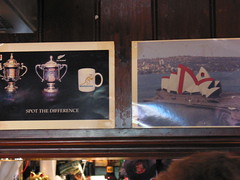
2005/6/5
This book looks interesting; it's apparently a travel guide for aspiring surrealists and such, filled with suggestions for offbeat ways of experiencing foreign locales:
Do you yearn for the glories of yesteryear? Pack an octogenarian guidebook and replace the subway with a penny farthing for an Anachronistic Adventure. Do you like to gamble? Taste the real thrill of adventure with Trip Poker or Monopoly Travel. Are you desperate for a holiday but strapped for cash? To undertake Budget Tourism low funds are not an obstance but a prerequisite.
2005/5/26
I'm back in London, having spent the last week in Melbourne. I had little time to access the net, spending most of my visit catching up with people and attending to various matters, hence the lack of blogging.
Melbourne was still where it had always been. A few things had changed (there's a JB Hi-Fi in Bourke St. where a discount clothing shop had been, 3RRR have moved out to Brunswick, and new trains had replaced most, but not all, of the old Hitachi trains), but generally, it felt as if I hadn't been away. People I knew were still there, and many of the familiar landmarks were as I remembered them. Oh, and EMI are still releasing corrupt CDs there.
My flight to Melbourne was a Qantas flight, whereas my flight back was with British Airways. Which are roughly similar, except that Qantas has better entertainment systems in cattle-class (you can actually play Tetris-like games on the screen in front of you), whereas BA has better in-flight duty-free shopping. The BA seats also had regular headphone sockets, thus allowing one to use something better than the craptacular headsets provided by airlines. (I had my Sennheiser PX200s with me, and they worked remarkably well; I'd say that actual noise-cancelling headphones are probably overkill.)
I briefly considered buying a PSP in Singapore (where they are out, unlike in Europe), though thought better of it, partly because of a lack of compelling titles (I've heard good things about Katamari Damacy, though that's not out on the PSP), and partly because no-one has figured out how to run user code on a current one yet.
Anyway, during my visit, I took some photos documenting Melbourne's café culture (the like of which I haven't seen in London); these photos may be found here.
2005/4/24
This weekend, I travelled to Aberystwyth, paying a visit to Jim and Catrin (whom I last saw in 2002). It was good to catch up with them again.
On Saturday night, I went to see the Castaway Theatre Company's performance of Alfred Jarry's Ubu Enchained. It was fittingly anarchic; they had five people each playing Pa Ubu and Ma Ubu, mostly attired in vaguely punky combinations of random clothes, and a lot going on on stage, most of it rather absurd. It reminded me a lot of the Doug Anthony Allstars, in particular DAAS Kapital. The music played in/between various sequences included a lot of guitar punk and several Half Man Half Biscuit songs, which worked rather well. Anyway, there are some photos here.
The journey to/from Aberystwyth involved a stopover in Birmingham, and a bus between there and Telford, due to railway works. On the way back, I spent some time wandering around Birmingham, raiding the local Music & Video Exchange and taking a stroll around the pedestrianised neo-brutalist cityscapes of the Bullring. For some reason, Birmingham reminded me a little of Brisbane.
The London-Birmingham leg of the journey was on a Virgin Trains Pendolino train, which was fairly nifty. For one, they come with laptop power points, even in cattle-class. (Now that's one thing I can't see ever being installed on the Melbourne-Sydney XPT, partly because rurals and bikies generally don't carry laptops.) Also, the way they tilt when they round a corner is pretty nifty.
(Note to self: make more excuses to get out of London; by which I mean far enough out to get out of London's reality distortion field. Living in London, it's too easy to start thinking of everything in terms of Tube lines, N|W|E|[NS][EW]|[EW]C postcodes and relative position to the Thames, and to forget that there is life and activity in Britain that's not in relation to London.)
2005/2/14
Via bOING bOING, a gonzo guide to weird stuff to see in Tokyo; from prog-rock cafés to rockabilly shopping malls, from places to people-watch to shops selling all sorts of bizarre fetish materials, there's a lot here for the connoisseur of the extreme and the strange.
2004/11/26
Young Europeans are moving to India to work in call centres, as that's where the jobs are. They get paid Indian wages (i.e., a pittance when translated to euros, pounds or krone), but get free accommodation, subsidised food and free taxi fares to/from work, as well as sufficiently flexible schedules to travel around the country. At the moment it seems more like a backpacker working-holiday thing (somewhere between the two Australian rites of passage, the backpacking trip through Thailand and pulling pints in a pub in the UK) than a new trend in migration, though many are staying for longer, mostly for the culture and lifestyle (or possibly to defer the shock of finding how little their bank balance is worth back home).
2003/12/30
 Two things I ended up taking back from Byron Bay: a bag of Byron Chai mix (which is quite good; one of the better chai mixes I've tried), and a small jar of lemon aspen jelly (which tastes like lemons, only perhaps slightly more sour). Apparently lemon aspen jelly is made from lemon aspens (a native plant that only grows in Australian rainforests), and not lemons aspen (though it sounds like it should be).
Two things I ended up taking back from Byron Bay: a bag of Byron Chai mix (which is quite good; one of the better chai mixes I've tried), and a small jar of lemon aspen jelly (which tastes like lemons, only perhaps slightly more sour). Apparently lemon aspen jelly is made from lemon aspens (a native plant that only grows in Australian rainforests), and not lemons aspen (though it sounds like it should be).
2003/12/20
I spent the past two nights in Byron Bay. My impressions of the place:
- Most of the population appears to be tourists; mainly young people (permanently or temporarily) associated with the Skeg subculture. Maybe this is just a summer thing.
- Furthermore, most of the people employed here (at least in tourist-related industries) appear to be either British or Canadian.
- The notorious yuppification: there don't seem to be too many signs of it; a few luxury cars here and there, and the prices in the local real-estate shop windows (you won't have much change left over from a million if you buy a place here). Alas, there are no 802.11 access points anywhere in town; mind you, WiFi in Australia appears to be mostly a Sydney thing.
- Were I a wealthy man, I'm not sure that my first choice of locations for a summer residence would be a town swarming with hordes of young tourists.
- Having said that, things cost about twice as much as they do in Melbourne; you can spend almost $10 on a croissant and a pot of chai, or $25 on a curry dinner (albeit a mango curry you're unlikely to get back home).
- Virtually all the cafés serve chai, as well as something called LSD (the last two letters standing for Soy and Dandelion).
As far as local establishments go that I've been to, I rather liked the Twisted Sista Café; on the opposite side of the road, the Cardamom Pod is also good, as a cheapish curry place. (That's not the mango curry place; that's Oh! Delhi.)
All in all, I liked Byron Bay, though I can't help get the feeling that the town was a lot more charming before it became so popular. I suspect that over the next few decades it may turn into another Gold Coast.
2003/12/17
Today I had occasion to catch a tram from Glebe to Central Station. One thing I noticed about Sydney's trams (all one line that they have there, much like Manchester or LA or someplace) was that they have TV screens installed on board, with sound, which play some sort of "entertainment programming", consisting of ads and extreme-sports segments. Which looks like the sort of thing that giant TV screen in Bourke St. shows.
Mind you, the trams there do have air conditioning you can actually feel, as opposed to the pitifully weak effort on Melbourne's trams/trains (presumably adjusted down to the bare minimum to cut the privatised operators' electricity costs). Perhaps that's what the ad revenue pays for?
Sydney's buses also have video screens, which today were displaying Fun Facts About Christmas (i.e., about reindeer and Christmas trees and such, not about Jesus Christ or Mithras or the like). Not sure what the point of those is; perhaps they'll gradually sneak in ads?
(Yes, I'm in Sydney right now; I'm typing this from Peter's house. I've been on the road since Sunday, hence the recent sparsity of blogging.)
2002/11/30
A British environmental thinktank says that high-speed trains should replace air travel on short-distance routes across Britain and Europe. Citing environmental damage caused by air travel, the Royal Commission on Environmental Pollution is calling for extra charges on air travel to represent the environmental cost, and a shift towards high-speed rail. Which all makes sense.
(Tangent: Which reminds me of something I read in the Guardian weekend magazine whilst in London; an ecological pundit in the UK (in Scotland, I believe) posited the idea that everybody should have a fixed annual number of carbon credits, which would be depleted whenever they used a car, rode a bus, used heating, &c., in proportion to the amount of fossil fuel used. To save the world from imminent doom, he argued, the allowance would need to be set so low that most people would only use cars in emergencies. Credits could be bought and sold, so poorer people could sell theirs, ride bicycles and wear thick jumpers, and the rich could buy enough to holiday in the tropics. True to form, the author of this proposal eschews travel to overseas conferences, sending addresses on cassette instead.)
(Tangent 2: Intercontinental rail will be a different issue altogether; I recall that the Russians were planning a rail tunnel from Siberia to Alaska some years ago, which would make it possible (if slow) to catch a train from London to New York.)
2002/11/25
And here are a few of the better or more interesting photos I took during my recent trip to the UK. These are just from the first part of the trip, mostly around London. (Click on the thumbnail excerpt to see the full image.)

Seen in a toy shop at Singapore's Changi airport; a rather appropriate name for a toy SUV, don't you think?

Graffito found on a street sign near Notting Hill. A laudable sentiment, wouldn't you say?

It's the signage on a shop on Carnaby St., though it sounds like an indie-pop concept album idea to me.
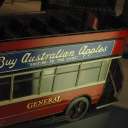
A model omnibus at the London Transport Museum. Pay particular attention to the advertising banner.
A few scenes from a pub in West Ealing on a Sunday afternoon:


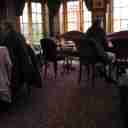
Those quaintly Orwellian posters that are all over bus shelters and the Tube. It's funny how some terrorist bombs and the ravings of a few apocalyptic bampots can make the watchful gaze of Big Brother so much more comforting as an idea.
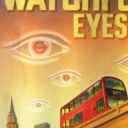
A rather good sunset over the Thames and Houses of Parliament:
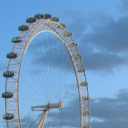
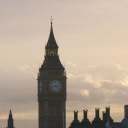
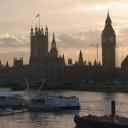


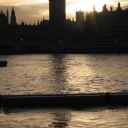
(All photos are (c) me. If you want to use any of them, email me.)
2002/11/21
Well, after 24 hours of sitting on a packed airliner (no empty row of seats to sleep on this time), I arrived back in Melbourne, tired, jetlagged and aware that I've spent too much money. (And I got stung on the excess baggage thing too; ouch. Damn you, Fopp.) And I have some idea of what Luke must have felt like to be back in Sydney.
Normal blogging will resume shortly.
2002/11/14
I just got back to London, after five days spent up north in the land of whisky and Irn-Bru. It was fun.
Yesterday I caught the train down from Inverness, through the sweeping landscapes of central Scotland, to Glasgow, the city that gave us Mogwai, Belle & Sebastian and a lot of twee jangly-pop bands somewhat before my time. Within a few hours of arriving, I had made my way to The 13th Note, a local café and band venue, which seemed quite cool, and has bands on pretty much every night. (For the Melburnians reading this: the 13th Note would be somewhere between the Empress and the Tote, or perhaps like Revolver without the house music and vague miasma of wankerdom subtly permeating everything; it's a funky-yet-too-grungy-to-be-yuppified bar with vegan food, artworks on the walls and flyers everywhere else, and a subterranean cavern where the punters go to see bands make a lot of noise.)
(Aside: Glasgow seems to have a number of things in common with Melbourne. The rain, the grid-shaped street layout, the relative lack of spectacular monuments, and of course a vibrant live music scene. It doesn't have trams, though, and the closest thing to the notorious Rangers vs. Celtics sectarian rivalries that Melbourne would have would be the occasional Serbo-Croatian soccer riot or something.)
2002/11/12
I spent the day walking around Inverness and its environs, taking a stroll up and down the banks of the Ness. As I was walking around town, I thought that Inverness would be a great setting for a mystery story or thriller. As I was walking upstream, through the autumnal landscape, the river slowly flowing towards the Moray Firth around islands full of high trees, I realised why: because the landscape looks somewhat like the landscape of British Columbia, Canada, which (through films and television from the X Files to Insomnia) has become shorthand for that type of story.
I also stopped by at the whisky shop and picked up a bottle of something called Athol Brose, purely on the strength of the Cocteau Twins having titled a song after it. It's quite nice.
2002/11/10
I'm in Edinburgh right now; I'm posting this from a (somewhat expensive though centrally located) Internet café at Waverley Station, and won't be able to post photos until I'm back in London at least (within a week, most probably). There's a Human League song playing on the radio, which is somewhat unusual perhaps.
Edinburgh is a very impressive-looking place; more so than London, I'd say. It's built on the slopes of hills (around a castle of historic significance), and thus you have interesting things such as streets on different levels, entire streets going under other streets, buildings with two ground floors and lanes which are winding stone staircases. Which, as you can imagine, looks quite doovy.
A word of advice for visitors to Edinburgh: if you're keen on photography (or just nice views), go to Calton Hill. (Why doesn't every city have high hills with impressive neoclassical monuments in the centre?) If you're afraid of heights, ignore the preceding advice.
(Another word of advice: don't bother with those British Telecom Internet-enabled payphones. They're a nice idea, but the implementation leaves a lot to be desired. For one, the vandal-proof, payphone-style keyboards are impossible to type on at all comfortably, and the keys tend to behave somewhat erratically unless whacked with great determination. (And also the custom browsing software they use lacks certain amenities, such as, say, HTTP authentication. Haven't these people heard of Mozilla?))
2002/11/7
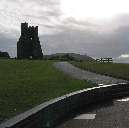 I never did end up making it to Machynlleth; as I was making my way to the 13:35 train, I remembered that I hadn't visited the record shop (which Jim had recommended), and so I went to check it out. (I ended up buying 4 CDs there.) Then I caught the next train out, which was meant to be 2 hours later, but was about 15 minutes late on top of that. Britain's railway network, it seems, has seen better days. Anyway, I'm back in London, for now anyway.
I never did end up making it to Machynlleth; as I was making my way to the 13:35 train, I remembered that I hadn't visited the record shop (which Jim had recommended), and so I went to check it out. (I ended up buying 4 CDs there.) Then I caught the next train out, which was meant to be 2 hours later, but was about 15 minutes late on top of that. Britain's railway network, it seems, has seen better days. Anyway, I'm back in London, for now anyway.
(I also managed to score a short-sleeved Ben Sherman shirt which was marked down to £18 at a local clothing shop. That's one of the advantages of visiting from the other hemisphere, where it is short-sleeve weather.)
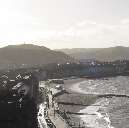 Anyway, I rather liked Aberystwyth. It's a rather charming combination of Victorian seaside resort (smack bang in the middle of the Welsh riviera), rural Celtic village and happening university town. The weather also seemed quite mild there too; I'm told that because of Aberystwyth's location, it usually is.
Anyway, I rather liked Aberystwyth. It's a rather charming combination of Victorian seaside resort (smack bang in the middle of the Welsh riviera), rural Celtic village and happening university town. The weather also seemed quite mild there too; I'm told that because of Aberystwyth's location, it usually is.
2002/11/6
I'm in Aberystwyth; I arrived on the train last night, and met up with Jim and Catrin, at whose quite pleasant (and undeniably fire-safe, judging by the bilingual warning signs on all the doors) flat I stayed overnight. Anyway, they're both quite nice people, and as interesting to talk to in real life as online.
I saw parts of a video of the production of A Clockwork Orange in which they acted (Jim playing the minister and Stanley Kubrick, and Alex and the prison chaplain all played by multiple actors; also, the main actor playing Alex was female), which was quite horrorshow. I also saw some fragments of the local Welsh-language channel (S4C); there's some rather high-quality film made here which unfortunately doesn't make it out into the wider world because it's in Welsh. (There's even a Welsh anime-style film, which looked quite impressive.)
I spent most of this morning wandering up and down Aberystwyth (an undeniably charming place; I can see why people who come here often end up staying), taking photographs and picking up bits of Welsh from the bilingual signs. I'll probably stop at Machynlleth (sp?) on the way back.
2002/11/3
I've been a bit quiet lately, because I've been too busy wandering around London to blog. I spent yesterday wandering around and doing some shopping. (It appears that Ben Sherman shirts are actually cheaper in Melbourne than here, as I found to my dismay; though at least here you can find a good range of Radiohead/W.A.S.T.E. T-shirts in shops.)
Today, however, I spent much of the day wandering around the Victoria & Albert Museum. It really is a fantastic place; it has huge warrens of rooms full of all sorts of objects and artefacts; from the personal effects of 16th-century people to machines made in the Renaissance (some of which look surprisingly modern), to designer plastic radios from the 1970s to huge statues, along with insights into the worlds from which these artefacts came.
Luckily the weather is looking up somewhat, as from tomorrow I'll be travelling around a bit.
2002/10/31
Seen on a flyer picked up from a record shop in Islington:
Bowlie Nite
1st Thursday of every month at Lounge Bar
DJ's
The Hatster
Kid Sinead and Friends
With regular guests including:
Billy Reeves (BBC London Live)
Playing Bowlie favourites such as: Free Design, Mamas & Papas, Beach Boys, Young Marble Giants, Stereolab, Belle & Sebastian, Black Box Recorder, Broadcast and a Bowlie shaking selection of 60s/French Pop, Northern Soul, 50's Jives and varied records of sweet and melodic sounds, old, new & rare!
The obverse of the flyer has a drawing from an old children's book of a little boy and girl running along a street, with a Belle & Sebastian lyric printed over it.
Does anyone know what the word "Bowlie" means in this context? I get the feeling it's a (new?) name for a twee-pop subculture, but why Bowlie?
2002/10/25
So here I am in London, home of the brash outrageous and free. I'm now typing this on a borrowed laptop in Ealing (a perfectly pleasant and very leafy sort of place). After hopping on a plane and spending some 20 hours onboard, mostly watching the animated map on the screen in front of me, I spent much of the day wandering around Notting Hill and Soho, and managed to visit a few of the local record shops. I only picked up 4 CDs, though (a promo copy of Primal Scream's Autobahn 66, Neil Finn's cover of There Is A Light That Never Goes Out (only £1, and so far sounds quite decent, if not particularly different from the original), Röyksopp's nicely electroclashy Remind Me single, and the Pop Romantique compilation with Air and Ivy and such, all at Music & Video Exchange).
A few observations while I still remember:
- The new Flaming Lips album (heard on the plane over here) is good. I'll probably have to pick it up.
- Sunsets from 30,000 feet don't look anywhere near as interesting as you'd think they would.
- There's a shop in Carnaby St. called Casio @ Carnaby, whose name sounds like an indie-pop compilation album concept.
- No matter how many CDs you burn to take with you, there'll be something you want to listen to which you left at home.
Anyway, I'm about to fall over, so it's goodbye from me for now. More to come later, including possibly photos if I sort out some technical problems.
Btw, does anyone know a good way of getting Windows 95 to talk to USB Mass Storage devices (i.e., CompactFlash readers), or IDE storage devices? Is it doable?
2002/10/18
An American tourist's account of North Korea, that bizarre bastion of fetishistic neo-Stalinism and insular paranoia.
The spectacle was something I'll never forget, though perhaps not for the reasons Mr. Huk and his countrymen intended. The show was so precise as to be robotic. No one outside the group, everyone buried within it. All done with a flair and focus that was chilling to behold. The model of mass unity that was being held up as proof of greatness and independence smacked of mindlessness. Of course everyone in the performance was human, with their own hopes, dreams and desires. This though was something to be eliminated, not tolerated or encouraged. These were things that still had to be rooted out in an effort to build the utopian, Juche-centered society. The zeal in Mr. Huk's voice spoke not of a country, but of a cult.
(via Reenhead)
2002/8/6
Two English teenagers thought they were going on a holiday to Australia -- only to discover that they were in Canada. They suspected that the aircraft was too small, and discovered where they really were uon seeing a sign reading "welcome to Sydney, Canada". The mistake was believed to be the fault of the travel agent.
